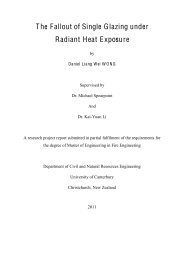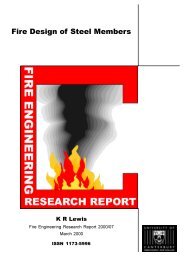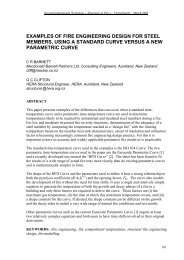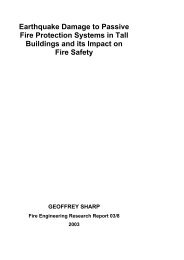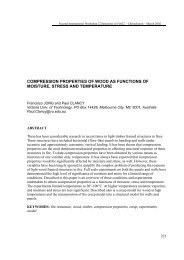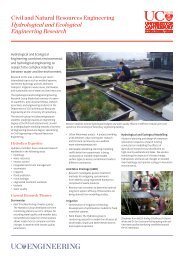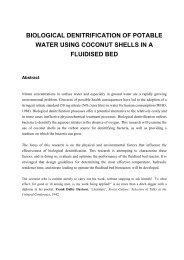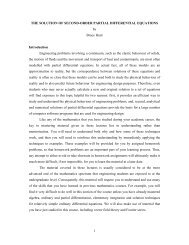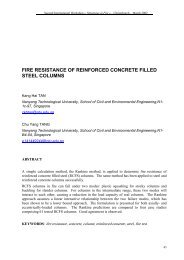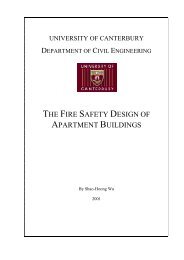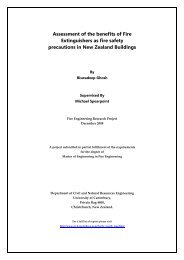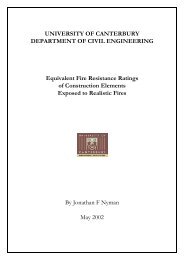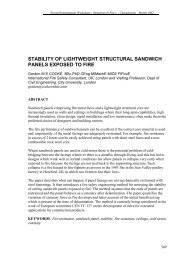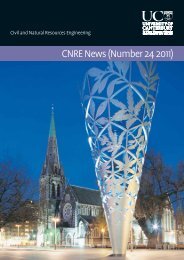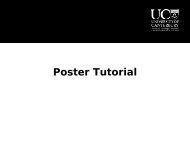University of Canterbury Department of Civil and Natural Resources ...
University of Canterbury Department of Civil and Natural Resources ...
University of Canterbury Department of Civil and Natural Resources ...
Create successful ePaper yourself
Turn your PDF publications into a flip-book with our unique Google optimized e-Paper software.
<strong>University</strong> <strong>of</strong> <strong>Canterbury</strong><br />
<strong>Department</strong> <strong>of</strong> <strong>Civil</strong> <strong>and</strong> <strong>Natural</strong> <strong>Resources</strong> Engineering<br />
2008 Undergraduate H<strong>and</strong>book<br />
Message from the Head <strong>of</strong> <strong>Department</strong>......................................................................2<br />
1. Help Directory ...................................................................................................3<br />
1.1 <strong>Department</strong>..................................................................................................3<br />
1.2 College <strong>of</strong> Engineering Office Staff List....................................................4<br />
2. Bachelor <strong>of</strong> Engineering (Honours)....................................................................5<br />
2.1 Introduction.................................................................................................5<br />
2.2 First Pr<strong>of</strong>essional.........................................................................................5<br />
2.3 Second Pr<strong>of</strong>essional ....................................................................................9<br />
2.4 Third Pr<strong>of</strong>essional – <strong>Civil</strong> Engineering ....................................................13<br />
2.5 Third Pr<strong>of</strong>essional – <strong>Natural</strong> <strong>Resources</strong> Engineering...............................17<br />
2.6 Other Requirements for the BE (Hons) Degree........................................19<br />
3 Postgraduate Studies .........................................................................................21<br />
3.1 Overview ...................................................................................................21<br />
3.2 ME (<strong>Civil</strong>) .................................................................................................21<br />
3.3 Master <strong>of</strong> Engineering in Fire Engineering (MEFE)................................26<br />
3.4 Master <strong>of</strong> Engineering in Transport Engineering (MET) .........................28<br />
3.5 MEngSt .....................................................................................................30<br />
4 <strong>Department</strong>al Policies <strong>and</strong> Procedures .............................................................31<br />
4.1 Overview ...................................................................................................31<br />
4.2 Resolving Problems ..................................................................................31<br />
4.3 Assessment................................................................................................31<br />
4.4 Aegrotat Consideration .............................................................................37<br />
4.5 Enrolment <strong>and</strong> Course Selection...............................................................37<br />
4.6 Pr<strong>of</strong>essional Conduct ................................................................................39<br />
4.7 Computer <strong>Resources</strong> .................................................................................40<br />
4.8 Teaching Days...........................................................................................42<br />
4.9 Laboratory Safety......................................................................................43<br />
4.10 Student Liaison Committees .....................................................................43<br />
4.11 Field Trips .................................................................................................43<br />
4.12 Course Surveys..........................................................................................43<br />
4.13 Student Noticeboards ................................................................................44<br />
5. Further Information...........................................................................................45<br />
5.1 <strong>University</strong> Calendar ..................................................................................45<br />
5.2 Health <strong>and</strong> Safety ......................................................................................45<br />
1<br />
`
Message from the Head <strong>of</strong> <strong>Department</strong><br />
Welcome to the <strong>Department</strong> <strong>of</strong> <strong>Civil</strong> <strong>and</strong> <strong>Natural</strong> <strong>Resources</strong> Engineering.<br />
The <strong>Department</strong>, which has existed as the <strong>Department</strong> <strong>of</strong> <strong>Civil</strong> Engineering since<br />
about 1930, has recently changed its name to the <strong>Department</strong> <strong>of</strong> <strong>Civil</strong> <strong>and</strong> <strong>Natural</strong><br />
<strong>Resources</strong> Engineering. The new name reflects the fact that we <strong>of</strong>fer two BE<br />
(Hons) programmes, one in <strong>Civil</strong> Engineering (this has been <strong>of</strong>fered at the<br />
<strong>University</strong> <strong>of</strong> <strong>Canterbury</strong> since 1888) <strong>and</strong> one in <strong>Natural</strong> <strong>Resources</strong> Engineering<br />
(this started in 1967 as Agricultural Engineering, <strong>and</strong> became the responsibility <strong>of</strong><br />
the <strong>Department</strong> in 2004, when Lincoln <strong>University</strong> withdrew its support).<br />
The <strong>Department</strong> has a long history <strong>of</strong> educating Pr<strong>of</strong>essional Engineers to a high<br />
st<strong>and</strong>ard, with the BE (<strong>Civil</strong>) degree being the first degree outside the United<br />
Kingdom to be accepted by the UK Institution <strong>of</strong> <strong>Civil</strong> Engineers as meeting their<br />
academic requirements for a Pr<strong>of</strong>essional Engineer.<br />
Both the <strong>Civil</strong> <strong>and</strong> <strong>Natural</strong> <strong>Resources</strong> programmes have recently been re-accredited<br />
by the NZ Institution <strong>of</strong> Pr<strong>of</strong>essional Engineers, <strong>and</strong> this means that the two degrees<br />
are recognised internationally, so you can (once you have completed either degree)<br />
practise as a Pr<strong>of</strong>essional Engineer around the world. The degree programmes must<br />
ensure students achieve an appropriate st<strong>and</strong>ard in certain topics, otherwise they<br />
will lose accreditation. Hence, all topics in the programmes are important <strong>and</strong><br />
relevant to the education <strong>of</strong> Pr<strong>of</strong>essional Engineers.<br />
The dem<strong>and</strong> for our graduates is very high <strong>and</strong> is expected to remain high for the<br />
foreseeable future. Our graduates work in a very wide range <strong>of</strong> ‘practice areas’,<br />
including <strong>Civil</strong>, Transport, Structural, Waste/Water, Environmental/Ecological,<br />
Geotechnical <strong>and</strong> Fire. There are plenty <strong>of</strong> opportunities, challenges <strong>and</strong> rewards in<br />
all these areas; none is inherently more challenging, exciting, rewarding or ‘highstatus’<br />
than the others.<br />
Both BE (Hons) programmes are designed to provide you with a good<br />
underst<strong>and</strong>ing <strong>of</strong> a wide range <strong>of</strong> topic areas; indeed, the most common ‘practice<br />
area’ for our graduates is <strong>Civil</strong>, which involves a wide range <strong>of</strong> activities. You will<br />
be able to specialise to a limited extent during the BE (Hons), <strong>and</strong> you will be able<br />
to choose courses related to the particular practice area that appeals to you. If you<br />
wish to become a real specialist in any area, you will need to undertake<br />
postgraduate study, <strong>and</strong> the <strong>Department</strong> already has a number <strong>of</strong> specialist Masters<br />
programmes (with others under development) <strong>and</strong> a PhD programme. We look<br />
forward to seeing a substantial proportion <strong>of</strong> you returning for postgraduate studies.<br />
Finally, I hope your studies go well, but remember that what you learn depends to a<br />
considerable extent upon the effort that you make.<br />
Alan Nicholson<br />
2<br />
`
1. Help Directory – 2008<br />
1.1 <strong>Department</strong><br />
The people primarily involved in managing the undergraduate programmes within<br />
the <strong>Department</strong> <strong>of</strong> <strong>Civil</strong> <strong>and</strong> <strong>Natural</strong> <strong>Resources</strong> Engineering are listed below. For<br />
administrative enquiries you should go to the Undergraduate Administrator in the<br />
first instance. For queries with respect to your Pr<strong>of</strong>essional year <strong>of</strong> study, the<br />
appropriate Pr<strong>of</strong>essional year co-ordinator should be your point <strong>of</strong> contact.<br />
Head <strong>of</strong> <strong>Department</strong>: Alan Nicholson (Room E427)<br />
Email: Alan.Nicholson@canterbury.ac.nz<br />
Undergraduate Catherine O'Shaughnessy (Room E424)<br />
Administrator:<br />
Email: Catherine.Oshaughnessy@canterbury.ac.nz<br />
Director <strong>of</strong> Undergraduate<br />
Studies:<br />
First Pr<strong>of</strong>essional Year<br />
Co-ordinator:<br />
Second Pr<strong>of</strong>essional Year<br />
Co-ordinator:<br />
Third Pr<strong>of</strong>essional Year<br />
Co-ordinator:<br />
Practical Work<br />
Co-ordinator:<br />
Roger Nokes (E425) - to be confirmed<br />
Email: Roger.Nokes@canterbury.ac.nz<br />
Rajesh Dhakal (E436)<br />
Email: Rajesh.Dhakal@canterbury.ac.nz<br />
Stefano Pampanin (E414)<br />
Email: Stefano.pampanin@canterbury.ac.nz<br />
James Mackechnie (E421)<br />
Email: James.Mackechnie@canterbury.ac.nz<br />
Tom Cochrane (E407) - to be confirmed<br />
Email: Tom.cochrane@canterbury.ac.nz<br />
Other Contacts<br />
The following staff can provide support in the following specific areas:<br />
Book purchases: Catherine O'Shaughnessy (Room E424)<br />
Use <strong>of</strong> computers:<br />
Safety issues:<br />
Br<strong>and</strong>on Hutchison (Room E212d)<br />
David MacPherson (Room B120 Fluids Lab)<br />
Additional department information is available on the Web:<br />
http://www.civil.canterbury.ac.nz<br />
3<br />
`
1.2 College <strong>of</strong> Engineering Office Staff List<br />
Pro-Vice-Chancellor: Peter Jackson (Room 112)<br />
Email: Peter.jackson@canterbury.ac.nz<br />
PA to PVC: (Room 110)<br />
College Manager: Ian Lothian (Room 113)<br />
Email: Ian.lothian@canterbury.ac.nz<br />
Dean - Engineering <strong>and</strong> Forestry: Richard Duke (Room 107)<br />
Email: Richard.duke@canterbury.ac.nz<br />
Academic Manager: Lisa Carter (Room 105)<br />
Email: Lisa.carter@canterbury.ac.nz<br />
Student Advisor: Cecilia King (Room 107)<br />
Email: Cecilia.king@canterbury.ac.nz<br />
Practical Work Co-ordinator: Cheryl McNickel<br />
Email: Cheryl.mcnickel@canterbury.ac.nz<br />
4<br />
`
2. Bachelor <strong>of</strong> Engineering (Honours)<br />
2.1 Introduction<br />
On entry to the School <strong>of</strong> Engineering all students are enrolled in the Bachelor <strong>of</strong><br />
Engineering Honours degree programme. This programme is comprised <strong>of</strong> three<br />
pr<strong>of</strong>essional years <strong>of</strong> study.<br />
The <strong>Department</strong> <strong>of</strong> <strong>Civil</strong> <strong>and</strong> <strong>Natural</strong> <strong>Resources</strong> Engineering hosts two separate<br />
degree programmes in <strong>Civil</strong> Engineering <strong>and</strong> <strong>Natural</strong> <strong>Resources</strong> Engineering. These<br />
two programmes have some elements in common, as can be seen below, but they<br />
are also quite distinct by the final year <strong>of</strong> study. In the sections below the courses<br />
that comprise each pr<strong>of</strong>essional year are listed together with their course<br />
prescriptions.<br />
On completion <strong>of</strong> your degree you will be awarded, either a BE(Hons) degree with<br />
first class, second class (divisions 1 <strong>and</strong> 2) or third class honours, or a BE degree<br />
without honours. The level <strong>of</strong> honours attained is based on your performance<br />
during the second <strong>and</strong> third pr<strong>of</strong>essional years. These are weighted 20% <strong>and</strong> 80%<br />
respectively. To be eligible for honours a student must complete the three<br />
pr<strong>of</strong>essional years in no more than four years <strong>of</strong> study <strong>and</strong> take no more than two<br />
years to complete any one pr<strong>of</strong>essional year.<br />
2.2 First Pr<strong>of</strong>essional<br />
2.2.1 Overview<br />
The first pr<strong>of</strong>essional year <strong>of</strong> study for both the BE(Hons) (<strong>Civil</strong>) <strong>and</strong> BE(Hons)<br />
(Nat Res) is common. The courses provide a broad introduction to key areas such<br />
as structures, geomechanics, fluid mechanics, transportation <strong>and</strong> GIS, <strong>and</strong><br />
environmental engineering. In addition, key skills in design, mathematics <strong>and</strong><br />
computation are developed.<br />
All <strong>of</strong> the courses listed below are compulsory. In special circumstances students<br />
may be permitted to alter their First Pr<strong>of</strong>essional courses. Cases for exemptions <strong>and</strong><br />
alterations are considered on a case by case basis <strong>and</strong> these should be presented to<br />
the 1 st Pr<strong>of</strong>essional year co-ordinator.<br />
5<br />
`
EMTH 210 Engineering Mathematics (Semester 1)<br />
EMTH 271 Mathematical Modelling <strong>and</strong> Computation 2 (Semester 2)<br />
ENCI 211 Design Studio 1 (Semester 2)<br />
ENCI 230 Mechanics <strong>of</strong> Materials (Semester 1)<br />
ENCI 234 Structural Engineering 1 (Semester 2)<br />
ENCI 241 Fluid Mechanics 1 (Semester 2)<br />
ENCI 252 Geotechnical Engineering 1 (Semester 1)<br />
ENCI 262 Survey, Transport & GIS (Semester 1)<br />
ENCI 271 Engineering Geology 1 <strong>and</strong> Hydrology (Semester 2)<br />
ENNR 203 Environmental Quality <strong>and</strong> Ecosystems (Semester 1)<br />
Each course has an equal weighting <strong>of</strong> 0.1 EFTS or 12 points.<br />
Notes:<br />
Students are required to attend the First Pr<strong>of</strong>essional Camp. Field <strong>and</strong> plotting work<br />
at the Camp form part <strong>of</strong> the examination for ENCI 262 Survey, Transport <strong>and</strong> GIS.<br />
In 2008 the 5-day camp is to be held at Living Springs during the last week <strong>of</strong> the<br />
first semester break (20-25 April). The cost <strong>of</strong> the camp is included in your fees.<br />
2.2.2 Course Prescriptions<br />
EMTH 210 Engineering Mathematics<br />
The following topics will be covered:<br />
(a) Partial Differentiation: Chain rule, differentials, directional derivatives,<br />
gradient, divergence <strong>and</strong> curl. Extreme values <strong>and</strong> Lagrange multipliers.<br />
(b) Differential Equations: First <strong>and</strong> second order linear differential equations,<br />
Laplace transforms.<br />
(c) Integration: Line integrals, elements <strong>of</strong> area, change <strong>of</strong> order <strong>of</strong> integration,<br />
polar co-ordinates, volume elements, cylindrical <strong>and</strong> spherical co-ordinates.<br />
(d) Fourier series: An introduction.<br />
(e) Linear Algrebtra: Eigenvalues <strong>and</strong> eigenvectors, applications to systems <strong>of</strong><br />
equations <strong>and</strong> geometry.<br />
EMTH 271 Mathematical Modelling And Computation<br />
Use <strong>of</strong> the package MATLAB including matrix, algebra, user-defined functions,<br />
surface plotting. Numerical methods including solutions <strong>of</strong> systems <strong>of</strong> linear<br />
equations, solution <strong>of</strong> ordinary differential equations <strong>and</strong> systems <strong>of</strong> equations,<br />
approximation techniques. Modelling projects. Engineering applications using<br />
spreadsheets.<br />
6<br />
`
ENCI 211 Design Studio 1<br />
Introduction to civil engineering design. Engineering drawing. Timber design.<br />
Integrated design concepts.<br />
ENCI 230 Mechanics <strong>of</strong> Materials<br />
Analysis <strong>of</strong> statically determinate structures. Stress <strong>and</strong> strain. Flexure, shear, axial<br />
<strong>and</strong> combined stress behaviour <strong>of</strong> beams <strong>and</strong> columns. Material science <strong>of</strong> steels.<br />
ENCI 234 Structural Engineering 1<br />
Analysis <strong>of</strong> deformations using integration <strong>and</strong> moment-area methods.<br />
Indeterminate analyses. Introduction to stiffness <strong>and</strong> plastic methods <strong>of</strong> analysis.<br />
Elastic buckling.<br />
ENCI 241 Fluid Mechanics 1<br />
Fluid properties. Hydrostatics. Control volume analysis <strong>of</strong> mass, energy <strong>and</strong><br />
momentum. Introduction to flow in pipes.<br />
ENCI 252 Geotechnical Engineering 1<br />
Physical properties <strong>and</strong> classification <strong>of</strong> soils. Stresses <strong>and</strong> strains in soil. Concept<br />
<strong>of</strong> shear strength <strong>and</strong> stiffness in soil masses. Pore fluid flow <strong>and</strong> permeability,<br />
steady flow <strong>and</strong> flow nets. Consolidation <strong>and</strong> settlement beneath foundations.<br />
ENCI 262 Survey, Transport <strong>and</strong> GIS<br />
Field survey techniques in plane surveying. Survey Camp. Introduction to<br />
transportation engineering. Traffic flow theory. Geometric design <strong>of</strong> roads <strong>and</strong><br />
railways <strong>and</strong> associated surveying calculations. Introduction to GIS.<br />
ENCI 271 Engineering Geology & Hydrology<br />
Introduction to the general principles <strong>of</strong> geology <strong>and</strong> hydrology as they apply to<br />
civil <strong>and</strong> natural resources engineering practice. Emphasis is placed on foundations<br />
materials, active processes effecting site selection, hydrological systems,<br />
measurements, <strong>and</strong> data interpretation.<br />
7<br />
`
ENNR 203 Environmental Quality <strong>and</strong> Ecosystems<br />
Introduction to ecology, hydrology <strong>and</strong> microbiology. Society <strong>and</strong> the environment.<br />
Resource Management Act. Mass balances. Water quality parameters.<br />
8<br />
`
2.3 Second Pr<strong>of</strong>essional<br />
2.3.1 Overview<br />
The second pr<strong>of</strong>essional year <strong>of</strong> study still retains some commonality between the<br />
two degree programmes – BE(Hons) (<strong>Civil</strong>) <strong>and</strong> BE(Hons) (Nat Res). Common<br />
areas are the study <strong>of</strong> mathematics, fluid mechanics, design, environmental<br />
engineering <strong>and</strong> infrastructure management. The civil programme provides a strong<br />
focus on the areas <strong>of</strong> structures <strong>and</strong> geomechanics while the natural resources<br />
degree emphasizes ecological engineering, water resources <strong>and</strong> natural geological<br />
systems.<br />
<strong>Civil</strong> Engineering<br />
The courses listed below are compulsory.<br />
Course<br />
Prerequisite Courses<br />
ENCI 302 Engineering Mathematics 3 (<strong>Civil</strong>) EMTH 210 (S1)<br />
ENCI 303 Engineering Decision-making HOD approval (S1)<br />
ENCI 312 Design Studio 2 ENCI 262, ENNR 203,<br />
ENCI 241<br />
(S1)<br />
ENCI 332 Structural Concrete ENCI 234 (S1)<br />
ENCI 333 Structural Steel ENCI 234 (S2)<br />
ENCI 334 Computational Mechanics EMTH 271, ENCI 234 (S2)<br />
ENCI 341 Fluid Mechanics 2 ENCI 241, EMTH 210 (S2)<br />
ENCI 351 Geotechnical Engineering 2 ENCI 252 (S2)<br />
ENCI 363 Infrastructure Management HOD approval (S1)<br />
ENCI 383 Environmental Engineering 2 ENNR 203 (S2)<br />
Students are required to attend the 2 nd Pr<strong>of</strong>essional Camp to be held at Wainui over<br />
the period 11-14 April 2008. The cost <strong>of</strong> the camp is included in your fees.<br />
9<br />
`
<strong>Natural</strong> <strong>Resources</strong> Engineering<br />
The courses listed below are compulsory.<br />
Course<br />
Prerequisite Courses<br />
ENCI 302 Engineering Mathematics 3 (<strong>Civil</strong>) EMTH 210 (S1)<br />
ENCI 303 Engineering Decision-making None (S1)<br />
ENCI 312 Design Studio 2 ENCI 262, ENNR 203,<br />
ENCI 241<br />
(S1)<br />
ENCI 341 Fluid Mechanics 2 ENCI 241, EMTH 210 (S2)<br />
ENCI 363 Infrastructure Management HOD approval (S1)<br />
ENCI 383 Environmental Engineering 2 ENNR 203 (S2)<br />
ENNR 305 Ecological Engineering 1 ENCI 281 or ENNR 203 (S2)<br />
ENNR 306 Integrated Catchment Analysis ENNR 203, ENCI 262 &<br />
ENCI 271<br />
(S1)<br />
ENNR 346 Energy Engineering 1 ENCI 241 (S2)<br />
ENNR 364 Ground Engineering <strong>and</strong> ENCI 271 & ENCI 252 (S2)<br />
Geomorphology ENCI 252, ENCI 271 (S2)<br />
Students are required to attend the 2 nd Pr<strong>of</strong>essional Camp to be held at Wainui over<br />
the period 11-14 April 2008. The cost <strong>of</strong> the camp is included in your fees.<br />
All NRE 2nd pro students are expected to attend a four day field trip to be<br />
scheduled sometime between the 22nd <strong>of</strong> August <strong>and</strong> 8 September. The cost <strong>of</strong> the<br />
field trip is included in your fees.<br />
2.3.2 Course Prescriptions – Second Pr<strong>of</strong>essional<br />
ENCI 302 Engineering Mathematics 3 (<strong>Civil</strong>)<br />
Partial differential equations: applications <strong>of</strong> advanced mathematics to <strong>Civil</strong><br />
Engineering.<br />
ENCI 303 Engineering Decision Making<br />
Descriptive statistics; probability distributions; confidence intervals; statistical<br />
tests; linear regression; optimisation; decision theory; network analysis.<br />
ENCI 312 Design Studio 2<br />
Design <strong>of</strong> multi-disciplinary civil engineering projects; regulatory planning;<br />
construction scheduling <strong>and</strong> cost estimates.<br />
10<br />
`
ENCI 332 Structural Concrete<br />
Material science <strong>of</strong> concrete; reinforced <strong>and</strong> prestressed concrete theory; design <strong>and</strong><br />
detailing <strong>of</strong> concrete structural members.<br />
ENCI 333 Steel Structures 1<br />
Design. Material, tension members, columns, beams, beam-columns. Bolted <strong>and</strong><br />
welded connections.<br />
ENCI 334 Computational Mechanics<br />
System <strong>and</strong> structural dynamics. Matrix, finite-difference, <strong>and</strong> finite-element<br />
methods <strong>of</strong> analysis.<br />
ENCI 341 Fluid Mechanics 2<br />
Navier-Stokes equations, scale <strong>and</strong> dimensional analysis; irrotational flow;<br />
boundary layers; turbulent flow; lift <strong>and</strong> drag; open channel flow.<br />
ENCI 351 Geotechnical Engineering 2<br />
Analysis <strong>of</strong> stress developed by axle loads. Effect <strong>of</strong> traffic <strong>and</strong> environment on<br />
pavement response. Pavement management <strong>and</strong> serviceability. Characterisation <strong>of</strong><br />
pavement materials. Mechanistic <strong>and</strong> empirical design methods.<br />
ENCI 363 Infrastructure Management<br />
Engineering economics; time <strong>and</strong> financial management; contracts <strong>and</strong> contract<br />
administration; management information systems; infrastructure systems.<br />
ENCI 383 Environmental Engineering 2<br />
Microbial <strong>and</strong> environmental processes in water <strong>and</strong> soil, water <strong>and</strong> wastewater<br />
treatment, hazardous <strong>and</strong> solid waste, water quality modelling, air pollution.<br />
ENNR 306 Integrated Catchment Analysis<br />
Integrated catchment management, environmental impact assessment, spatial data<br />
analysis, Geographic information systems, catchment surface <strong>and</strong> groundwater<br />
hydrology, case studies in NRE.<br />
11<br />
`
ENNR 305 Ecological Engineering 1<br />
<strong>Natural</strong> <strong>and</strong> Human systems; System self design; Ecosystem processes; concepts<br />
<strong>and</strong> principles <strong>of</strong> ecological engineering.<br />
ENNR 346 Energy Engineering 1<br />
Energy forms, closed <strong>and</strong> open systems, first <strong>and</strong> second laws <strong>of</strong> thermodynamics,<br />
heat <strong>and</strong> mass transfer, energy converters <strong>and</strong> power transmission, power system<br />
characteristics, energy supply <strong>and</strong> dem<strong>and</strong>, alternative energy (bio fuels, wind,<br />
hydro, wave, <strong>and</strong> others).<br />
ENNR 364 Ground Engineering & Geomorphology<br />
A course integrating the principles <strong>of</strong> geomorphology <strong>and</strong> ground engineering. This<br />
course is aimed at giving a broad underst<strong>and</strong>ing <strong>of</strong> l<strong>and</strong>form evolution <strong>and</strong> its<br />
implications for engineering site selection. In addition it introduces analytical<br />
methods to quantifying the mechanics <strong>of</strong> soil behaviour <strong>and</strong> ground movement in<br />
natural <strong>and</strong> man-made terrain.<br />
12<br />
`
2.4 Third Pr<strong>of</strong>essional – <strong>Civil</strong> Engineering<br />
2.4.1 Overview<br />
The third pr<strong>of</strong>essional year <strong>of</strong> the civil engineering degree provides you with a<br />
great deal <strong>of</strong> flexibility. Only one course is compulsory – the first semester course<br />
on the management <strong>of</strong> engineering systems, ENCI403. Your remaining nine<br />
courses can be selected from the pool <strong>of</strong> elective third pr<strong>of</strong>essional courses, from<br />
courses outside the <strong>Department</strong>, or, perhaps, from advanced postgraduate courses.<br />
There are restrictions on the number <strong>and</strong> type <strong>of</strong> courses that can be taken at<br />
Masters level <strong>and</strong> from outside the department. Subject to Head <strong>of</strong> <strong>Department</strong><br />
approval you can take up to two courses from other departments provide you satisfy<br />
the necessary pre-requisites. You should discuss your options with the 3 rd<br />
Pr<strong>of</strong>essional year co-ordinator. This person has a list <strong>of</strong> courses that the department<br />
will not approve.<br />
Only academically strong students are allowed to enrol in Masters courses. The<br />
guideline, upon which the 3 rd Pr<strong>of</strong>essional year co-ordinator makes his/her decision,<br />
is that a student must have a GPA <strong>of</strong> 6 (B+), or more, in their second pr<strong>of</strong>essional<br />
courses to be able to enrol in a Masters course. If you are interested in this option<br />
please discuss it with the 3 rd Pr<strong>of</strong>essional year co-ordinator. A student can take, at<br />
most, two Masters level courses in the third Pr<strong>of</strong>essional year <strong>of</strong> study.<br />
13<br />
`
Each student must select nine papers chosen from the courses listed below. Note:<br />
ENCI 403 is compulsory.<br />
Course<br />
Prerequisite Courses<br />
ENCI 403 Management <strong>of</strong> Engineering Systems (S1)<br />
ENCI 412 Traffic Planning ENCI 363 (S1)<br />
ENCI 415 Pavement Engineering ENCI 351 (S2)<br />
ENCI 423 Structural Analysis ENCI 334 (S2)<br />
ENCI 425 Steel Structures ENCI 333 (S2)<br />
ENCI 426 Concrete Structures ENCI 332 (S1)<br />
ENCI 429 Structural Systems ENCI 332, ENCI 333,<br />
ENCI 334<br />
(S1)<br />
ENCI 443 Hydrology ENCI 271, ENCI 241 (S2)<br />
ENCI 444 Hydraulics ENCI 343 or ENCI 341 (S1)<br />
ENCI 452 Geotechnical Engineering 3 ENCI 302, ENCI 351 (S1)<br />
ENCI 472 Engineering Geology 2 ENCI 271 (S1)<br />
ENCI 482 Solid Waste Management ENCI 383 (S2)<br />
ENCI 493 <strong>Civil</strong> Engineering Project HOD Approval (whole year)<br />
ENCI 494 <strong>Civil</strong> Engineering Project HOD Approval (S1)<br />
ENCI 495 <strong>Civil</strong> Engineering Project HOD Approval (S2)<br />
ENCI 498 Special Topic - Design Project HOD Approval (S2)<br />
ENCI 499 Special Topic - Timber Eng ENCI 211 (S2)<br />
1. Students may not normally enrol for third pr<strong>of</strong>essional courses until they have completed<br />
the first pr<strong>of</strong>essional year.<br />
2. Subject to the approval <strong>of</strong> the Head <strong>of</strong> <strong>Department</strong>, a c<strong>and</strong>idate, may <strong>of</strong>fer, in place <strong>of</strong> one<br />
or two courses above, courses(s) from other department(s) for which the student satisfies the<br />
necessary pre-requisites. None <strong>of</strong> the courses can be credited towards another degree.<br />
Approval will be subject to consideration <strong>of</strong> previous courses taken by the student <strong>and</strong> the<br />
suitability <strong>of</strong> the course to the student’s degree.<br />
3. If you wish to take a ME course as one <strong>of</strong> your 3 rd Pr<strong>of</strong>essional options, you should consult<br />
the 3 rd Pr<strong>of</strong>essional Co-ordinator. To be eligible to take a ME course you must have at least<br />
a B+ average in 2 nd Pr<strong>of</strong>essional.<br />
4. Students wishing to undertake projects (493, 494, 495) must have at least a B average in 2 nd<br />
Pr<strong>of</strong>essional. You should consult the Project Co-ordinator.<br />
14<br />
`
2.4.2 Course Prescriptions – Third Pr<strong>of</strong>essional<br />
ENCI 403 Management <strong>of</strong> Engineering Systems<br />
Systems concepts <strong>and</strong> the context <strong>of</strong> engineering decisions. Engineering ethics.<br />
Mangement <strong>of</strong> people, projects <strong>and</strong> organisations in the construction industry.<br />
ENCI 412 Traffic Planning<br />
Transportation studies <strong>and</strong> traffic surveys. Traffic flow theory. Roadway <strong>and</strong><br />
intersection desgin. Road safety <strong>and</strong> accident reduction. Evaluation <strong>of</strong><br />
transportation projects. Environmental impacts. Traffic Management.<br />
ENCI 415 Pavement Engineering<br />
Analysis <strong>of</strong> stress developed by axle loads. Effect <strong>of</strong> traffic <strong>and</strong> environment on<br />
pavement response. Pavement management <strong>and</strong> serviceability. Characterisation <strong>of</strong><br />
pavement materials. Mechanistic <strong>and</strong> empirical design methods.<br />
ENCI 423 Structural Analysis<br />
Computational analysis <strong>of</strong> structures, including matrix methods, introduction to<br />
finitie-element methods <strong>and</strong> structural dynamics.<br />
ENCI 425 Steel Structures<br />
Behaviour <strong>and</strong> design <strong>of</strong> steel members. Plastic analysis <strong>and</strong> design <strong>of</strong> steel frames.<br />
Composite beams. Behaviour <strong>of</strong> steel frames during earthquakes. Steel connections.<br />
Fatigue <strong>and</strong> fracture mechanics.<br />
ENCI 426 Concrete Structures<br />
Seismic design <strong>of</strong> concrete structures that are <strong>of</strong> reinforced <strong>and</strong> precast concrete<br />
(beams, columns <strong>and</strong> walls) <strong>and</strong> concrete masonry. Details <strong>of</strong> prestressed concrete<br />
bridges.<br />
ENCI 429 Structural Systems<br />
Earthquake behaviour <strong>and</strong> design concepts. Slab Design. Plastic Analysis. Strut <strong>and</strong><br />
Tie Methods. Architecture/Structural Form. Engineering without numbers.<br />
15<br />
`
ENCI 443 Hydrology<br />
Streamflow measurement. Frequency analysis <strong>of</strong> extreme events (storms, floods,<br />
<strong>and</strong> droughts). Rainfall-run<strong>of</strong>f models. Distribution <strong>of</strong> rainfall <strong>and</strong> streamflow in<br />
New Zeal<strong>and</strong>. Groundwater flow.<br />
ENCI 444 Hydraulics<br />
Unsteady pipe flow <strong>and</strong> water hammer. Turbulent dispersion <strong>of</strong> effluents in open<br />
channels. Near-source mixing processes <strong>and</strong> their application to outfall diffuser<br />
design.<br />
ENCI 452 Geotechnical Engineering 3<br />
Stress-strain behaviour <strong>of</strong> soils <strong>and</strong> its modelling. Critical state soil mechanics.<br />
Introduction to plasticity. Use <strong>of</strong> lower <strong>and</strong> upper bound theorems in foundation<br />
engineering. Design <strong>of</strong> shallow foundations.<br />
ENCI 472 Engineering Geology 2<br />
Geological data collection <strong>and</strong> input for engineering works. Engineering geology<br />
case studies. Elementary rock mechanics. Engineering <strong>and</strong> environmental<br />
geophysics. L<strong>and</strong>scape development processes <strong>and</strong> active tectonics.<br />
ENCI 481 Wastewater Treatment Plan Design<br />
Physical <strong>and</strong> biological wastewater treatment plant design for municipal<br />
wastewaters. Project, laboratory, <strong>and</strong> field trip exercises.<br />
ENCI 482 Solid Waste Management<br />
L<strong>and</strong>fills, composting, incineration, <strong>and</strong> recycling. Integrated analysis <strong>of</strong> solid<br />
waste management systems. Project, laboratories, <strong>and</strong> field trips.<br />
16<br />
`
2.5 Third Pr<strong>of</strong>essional – <strong>Natural</strong> <strong>Resources</strong> Engineering<br />
2.5.1 Overview<br />
The third Pr<strong>of</strong>essional year <strong>of</strong> study in the natural resources programme includes<br />
both compulsory <strong>and</strong> elective courses. There are six compulsory courses, including<br />
the <strong>Natural</strong> <strong>Resources</strong> Engineering Project ENCI429. As each elective, except the<br />
project has a course weight <strong>of</strong> 0.1EFTS, <strong>and</strong> the project has a weight <strong>of</strong> 0.2 EFTS,<br />
you are free to choose three elective courses as outlined below. Up to a maximum<br />
<strong>of</strong> six courses, including the project, can be chosen in each semester <strong>and</strong> your<br />
choice <strong>of</strong> courses must be approved by the Head <strong>of</strong> <strong>Department</strong> (effectively the 3 rd<br />
Pr<strong>of</strong>essional year co-ordinator who has been delegated this task).<br />
Compulsory Courses:<br />
Course<br />
Prerequisite Courses<br />
ENNR 404 Hydraulic <strong>and</strong> Hydrologic Engineering ENNR 344, 345 (S1)<br />
ENNR 405 Ecological Engineering 2 ENNR 305 (S1)<br />
ENNR 422 Water <strong>Resources</strong> Engineering ENNR 344, 345 (S2)<br />
ENNR 426 Waste Engineering ENCI 383 (S2)<br />
ENNR 429 <strong>Natural</strong> <strong>Resources</strong> Engineering Project HOD Approval (Whole year)<br />
ENNR 460 <strong>Natural</strong> <strong>and</strong> Human Systems HOD Approval (S1)<br />
Elective Courses:<br />
(a) ENNR 423 Energy <strong>Resources</strong> Engineering<br />
(b) ENNR 431 Bioresources Engineering<br />
(c) Any courses <strong>of</strong>fered by the College <strong>of</strong> Engineering departments<br />
approximating 0.100 course weight <strong>and</strong> at an appropriate level<br />
(d) Any courses <strong>of</strong> the <strong>University</strong>, including those <strong>of</strong>fered by the College <strong>of</strong><br />
Engineering departments, approximating 0.100 course weight <strong>and</strong> at an<br />
appropriate level<br />
2.5.2 Course Prescriptions<br />
ENNR 404 Hydraulic <strong>and</strong> Hydrologic Engineering<br />
Hydraulic <strong>and</strong> Hydrologic design. Transients. Networks. Computational hydraulics.<br />
Hydraulic modelling.<br />
ENNR 405 Ecological Engineering<br />
Design <strong>and</strong> practices <strong>of</strong> ecological engineering technologies for the treatment <strong>of</strong><br />
wastewaters, rehabilitation <strong>of</strong> contaminated l<strong>and</strong>s, soil bioengineering (erosion<br />
control) <strong>and</strong> economics.<br />
17<br />
`
ENNR 422 Water <strong>Resources</strong> Engineering<br />
Management Science techniques in water resources. Dams <strong>and</strong> reservoirs. river<br />
engineering. Catchment modelling.<br />
ENNR 423 Energy <strong>Resources</strong> Engineering<br />
Principles, applications <strong>and</strong> design <strong>of</strong> energy production using natural resources,<br />
especially wind, solar, hydro, biomass <strong>and</strong> geothermal. Energy conservation, dem<strong>and</strong>,<br />
<strong>and</strong> policy. Energy <strong>and</strong> global environmental issues. Design <strong>of</strong> energy use systems.<br />
ENNR 426 Waste Engineering<br />
Conceptual aspects <strong>of</strong> environmental engineering. Waterborne <strong>and</strong> non-water<br />
borne systems. Principles <strong>and</strong> design <strong>of</strong> selected physical, chemical <strong>and</strong> biological<br />
treatment technologies, with an emphasis on natural systems, appropriate<br />
technologies <strong>and</strong> sustainability. Integrated system design. Field trips.<br />
ENNR 429 <strong>Natural</strong> <strong>Resources</strong> Engineering Project<br />
Detailed study <strong>and</strong> original work on an approved topic in <strong>Natural</strong> <strong>Resources</strong><br />
Engineering.<br />
ENNR 431 Bioresources Engineering<br />
Engineering <strong>and</strong> resource requirements <strong>of</strong> the bioresource systems <strong>of</strong> agriculture,<br />
horticulture, aquaculture, marine <strong>and</strong> freshwater fisheries <strong>and</strong> irrigation <strong>and</strong> drainage.<br />
ENNR 460 <strong>Natural</strong> <strong>and</strong> Human System<br />
Systems theory <strong>and</strong> analysis. Open systems, ecological systems, human systems.<br />
Examples <strong>of</strong> system behaviour in the Biosphere.<br />
18<br />
`
2.6 Other Requirements for the BE (Hons) Degree<br />
2.6.1 Practical Work Training<br />
Experience gained while working in industry during the summer vacations is a<br />
requirement <strong>of</strong> the BE (Hons) degree <strong>and</strong> is an important aspect <strong>of</strong> the degree<br />
programme. You will be required to complete two or three periods <strong>of</strong> employment,<br />
beginning with either workshop or manual <strong>and</strong> finishing with pr<strong>of</strong>essional<br />
engineering. A total <strong>of</strong> 120 days is required <strong>and</strong> approval is required for these jobs<br />
– see www.engf.canterbury.ac.nz/practicalwork.html for requirements.<br />
Students may be given partial or total exemption from Practical Work Training if<br />
they have completed an appropriate indentured apprenticeship or appropriate work<br />
for a NZ Certificate <strong>of</strong> Engineering. You must apply in writing to the College <strong>of</strong><br />
Engineering Practical Work Co-ordinator, Mrs Cheryl McNickel, for an exemption<br />
(Cheryl.mcnickel@canterbury.ac.nz).<br />
Further information can be obtained from the <strong>Department</strong> Practical Work<br />
Supervisor in the first instance.<br />
2.6.2 Practical Work Reports<br />
You must submit two satisfactory reports on two different types <strong>of</strong> practical work.<br />
These reports are confidential between the student <strong>and</strong> the College <strong>of</strong> Engineering.<br />
The report should not be disclosed to any other party. See<br />
www.engf.canterbury.ac.nz/practicalwork.html for details <strong>of</strong> the requirements for<br />
the work reports.<br />
Employers complete a report form for each student <strong>and</strong> each period <strong>of</strong> work. These<br />
reports detail the dates <strong>of</strong> employment, the hours worked, the type <strong>of</strong> work<br />
performed, <strong>and</strong> comments on student behaviour, attendance <strong>and</strong> performance.<br />
Unsatisfactory reports are discussed with the employer <strong>and</strong> the student, <strong>and</strong> may<br />
result in the work not being credited for the degree.<br />
2.6.3 First Aid Training<br />
At some stage before you graduate you are required to present to the College <strong>of</strong><br />
Engineering Office a valid First Aid certificate, taught by a <strong>University</strong> approved<br />
organisation. Courses in First Aid are arranged through the College <strong>of</strong> Engineering<br />
Office <strong>and</strong> will be listed on www.engf.canterbury.ac.nz/pwotherreqs.html.<br />
19<br />
`
2.6.4 Workshop Training<br />
In order to become familiar with workshop processes, methods, the use <strong>of</strong> h<strong>and</strong><br />
tools, welding, lathes <strong>and</strong> other machine tools, you are required to undertake<br />
workshop training. <strong>Department</strong>s organise individual courses. Further information<br />
about cost <strong>and</strong> timetables can be obtained from your department. This course is not<br />
available to Intermediate Year students.<br />
You should have completed workshop training before enrolling for any subject <strong>of</strong><br />
your Second Pr<strong>of</strong>essional Year.<br />
Exemptions may be given to students who have completed an appropriate<br />
indentured apprenticeship, or have completed appropriate work for a NZ Certificate<br />
<strong>of</strong> Engineering. You must apply in writing to the department’s Practical Work<br />
Supervisor (Tom Cochrane, E407) (to be confirmed) for an exemption.<br />
20<br />
`
3 Postgraduate Studies<br />
3.1 Overview<br />
Postgraduate study is a step all graduating engineers should consider. A masters<br />
degree is rapidly becoming the st<strong>and</strong>ard entry qualification for pr<strong>of</strong>essional civil<br />
engineers in Europe, North America <strong>and</strong> Japan, <strong>and</strong> a PhD has always been the<br />
necessary requisite for positions in academia or institutions involved in engineering<br />
research.<br />
All postgraduate courses <strong>of</strong>fered are subject to sufficient student numbers. Usually<br />
courses with fewer than four enrolments are not available. If you wish to take a<br />
postgraduate course as one <strong>of</strong> your 3rd Pr<strong>of</strong>essional options, you should consult the<br />
3rd Pr<strong>of</strong>essional year Co-ordinator <strong>and</strong> the academic in charge <strong>of</strong> the postgraduate<br />
course. Students who take a postgraduate course as part <strong>of</strong> their BE(Hons) are not<br />
permitted to take the same, or a similar, paper as part <strong>of</strong> a subsequent postgraduate<br />
degree.<br />
Postgraduate study information is available from the postgraduate administrator <strong>and</strong><br />
the Director <strong>of</strong> Postgraduate Studies.<br />
3.2 ME (<strong>Civil</strong>)<br />
The Master <strong>of</strong> Engineering degree is a research based masters qualification. It<br />
comprises courses totalling 0.4EFTS <strong>and</strong> a research thesis, <strong>and</strong> takes approximately<br />
18 months to complete. While some courses must be taken from the <strong>Department</strong> <strong>of</strong><br />
<strong>Civil</strong> <strong>and</strong> <strong>Natural</strong> <strong>Resources</strong> Engineering students have great flexibility in<br />
constructing a qualification that suits their own interests.<br />
Entry into the ME degree is limited to students with a BE(Hons) degrees with<br />
second class honours or better.<br />
3.2.1 Course Descriptions – <strong>Civil</strong><br />
Postgraduate Courses marked ** are not available for 3 rd Pro students<br />
Semester 1<br />
ENCI 611 Advanced Structural Steel**<br />
G MacRae/W Walpole<br />
Behaviour <strong>and</strong> design <strong>of</strong> steel members. Stability <strong>of</strong> frames. Limit state design<br />
rules. Earthquake resistant design. Design <strong>of</strong> braced frames.<br />
21<br />
`
ENCI 613 Structural Dynamics & Earthquake Engineering** ACarr/B Deam<br />
Dynamic behaviour <strong>of</strong> multi-degree <strong>of</strong> freedom structures <strong>and</strong> various computation<br />
methods with particular emphasis on non-linear structural response to earthquake<br />
excitation. Soil-structure interaction. Base isolation <strong>and</strong> passive control <strong>of</strong><br />
structures.<br />
ENCI 670 Special Topic – S<strong>of</strong>t Computing In Structural Engineering<br />
(Block Course)**<br />
S Barai<br />
S<strong>of</strong>t computing tools aim to exploit tolerance for imprecision, uncertainty <strong>and</strong><br />
partial truth to achieve tractability, robustness <strong>and</strong> low solution cost. The s<strong>of</strong>t<br />
computing tools include Fuzzy Computing, Neuro Computing, <strong>and</strong> Evolutionary<br />
Computing, etc. The proposed Short Term Course will cover – Introduction to s<strong>of</strong>t<br />
computing <strong>and</strong> related techniques, interactions between different s<strong>of</strong>t computing<br />
techniques, <strong>and</strong> application <strong>of</strong> s<strong>of</strong>t computing tools in different branches <strong>of</strong><br />
structural engineering – Structural Analysis, Design <strong>and</strong> Diagnostics. Each lecture<br />
will be followed by an interactive session on the subject matter.<br />
ENCI 669 Special Topic – Loss Estimation<br />
G MacRae/R Dhakal<br />
Decision making for earthquake loss in buildings. Ground motion hazard,<br />
engineering dem<strong>and</strong>, structural damage, non-structural damage, loss in terms <strong>of</strong><br />
deaths, damage <strong>and</strong> downtime. Structural modelling, probabilistic concepts, cost<br />
benefit analysis, loss estimation tools.<br />
ENCI 630 Special Topic - Nonlinear Concrete Mechanics ** R Dhakal<br />
Mechanical properties <strong>of</strong> Concrete, Strength <strong>and</strong> Failure Criteria <strong>of</strong> concrete in<br />
multi-axial loading conditions, Path-dependent cyclic average stress strain<br />
relationship <strong>of</strong> concrete <strong>and</strong> reinforcing bars, Cover concrete spalling,<br />
Reinforcement buckling, Prediction <strong>of</strong> buckling length, Confined concrete, Bond<br />
strength, Bond-slip relationship <strong>of</strong> reinforced concrete, Shear behaviour <strong>of</strong><br />
concrete, Stirrups contribution to shear strength or RC section, Nonlinear flexural<br />
analysis <strong>of</strong> reinforced concrete section, Prediction <strong>of</strong> nonlinear moment curvature<br />
relationship, Generation <strong>of</strong> force displacement relationship <strong>of</strong> a RC member, Effect<br />
<strong>of</strong> geometrical nonlinearity (P-delta effect), Relation between curvature ductility<br />
<strong>and</strong> displacement ductility, seismic design issues.<br />
ENCI 638 Environmental Fluid Dynamics<br />
R Nokes<br />
1. Introduction to environmental fluid dynamics – physical mechanisms. 2.<br />
Turbulence – structure <strong>of</strong> turbulent flows, governing equations, scales, turbulence<br />
22<br />
`
modelling, turbulent mixing in the environment, turbulent dispersion in rivers, <strong>and</strong><br />
turbulent jets. 3. Buoyancy effects – governing equations <strong>and</strong> scale analysis for<br />
free <strong>and</strong> forced convection, convection in horizontal layers, plumes, waves.<br />
ENCI 609 Special Topic - Construction Procurement <strong>and</strong> Contract<br />
Administration**<br />
N Allan<br />
Administration <strong>of</strong> construction contracts including forming construction contracts<br />
<strong>and</strong> subcontracts, procurement systems, contract dispute resolution, risk allocation<br />
in construction contracts, NZ <strong>and</strong> international st<strong>and</strong>ard conditions <strong>of</strong> contract.<br />
ENCI 610 Special Topic - Construction Management**<br />
N Allan<br />
Construction management looks at the key issues faced by managers during the life<br />
cycle <strong>of</strong> a construction project, from inception to commissioning <strong>and</strong> occupation.<br />
Classic management approaches <strong>and</strong> contemporary technique available to managers<br />
are discussed, including risk management, value management, benchmarking, lean<br />
construction <strong>and</strong> supply chain management. These concepts are presented in an<br />
integrating framework <strong>of</strong> systems thinking.<br />
Semester 2<br />
ENCI 601 Risk Assessment** (Block Course) E Seville<br />
Introduction to Risk Concepts: Societal vs individual risk; Perceived, assessed vs<br />
actual risk; Dimensions <strong>of</strong> risk; Risk identification. Risk Assessment: Data<br />
selection; Uncertainty <strong>and</strong> Sensitivity; Probability Distributions; Extreme value<br />
theory, Monte Carlo simulation; Fault <strong>and</strong> Event Trees; Reliability theory. Risk<br />
Evaluation & Management: Scoring systems; HAZOP, HAZAN, FOSM; Utility<br />
theory; Risk appetite <strong>and</strong> risk acceptability; Ethical aspects <strong>of</strong> risk evaluation; Risk<br />
management strategies. Risk Communication: Fairness <strong>and</strong> social distribution <strong>of</strong><br />
risk; Risk perceptions; Communicating risk concepts.<br />
ENCI 658 Special Topic - Strategic Management in Construction N Allan<br />
The theoretical <strong>and</strong> practical aspects <strong>of</strong> strategy formulation <strong>and</strong> decision-making<br />
as they affect local, national <strong>and</strong> international firms in the construction industry are<br />
reviewed. This is then developed to look at the relationship between business<br />
strategy <strong>and</strong> the business environment with a focus on the emergence <strong>and</strong><br />
development <strong>of</strong> new <strong>and</strong> existing construction markets for businesses both large<br />
<strong>and</strong> small. Possible ways <strong>of</strong> developing effective strategies for addressing the<br />
business threats <strong>and</strong> opportunities posed are outlined.<br />
23<br />
`
ENCI 660 Special Topic – Project Management – Planning <strong>and</strong> Control<br />
Techniques<br />
N Allan<br />
Construction management is viewed through the lens <strong>of</strong> project management <strong>and</strong><br />
the techniques available to the manager to plan <strong>and</strong> control project. Project lifecycles,<br />
feasibility studies, estimating <strong>and</strong> planning tools from work breakdown<br />
structures to computer aided methods are evaluated. Control techniques such as S-<br />
curves <strong>and</strong> earned value <strong>and</strong> how these are implemented by teams, organisations<br />
<strong>and</strong> project leaders is covered to ensure project quality <strong>and</strong> safety are achieved.<br />
ENCI 614 Timber Engineering (Block Course)<br />
A Buchanan<br />
Review <strong>of</strong> earthquake engineering principles; earthquake resistance <strong>of</strong> timber<br />
buildings; conceptual design <strong>of</strong> multi-storey buildings; ply shear <strong>and</strong> diaphragm<br />
action; traditional <strong>and</strong> innovative timber floor solutions; acoustics insulation <strong>and</strong><br />
fire resistance.<br />
ENCI 615 Advanced Structural Concrete; Displacement Based Seismic Design<br />
And Retr<strong>of</strong>it Techniques**<br />
S Pampanin<br />
Seismic design approaches (force-based or displacement-based). Performancebased<br />
design <strong>and</strong> assessment philosophy. Seismic design <strong>of</strong> precast/prestressed<br />
jointed ductile concrete structures. Self-centering-dissipating hybrid systems.<br />
Vulnerability assessment <strong>of</strong> existing reinforced concrete buildings. Seismic<br />
behaviour <strong>of</strong> beam-column joints <strong>and</strong> frame systems. Modeling aspects. Retr<strong>of</strong>it<br />
strategy with composite materials (Fibre Reinforced Polymers, FRP) or metallic<br />
low-invasive solutions materials.<br />
ENCI 616 Finite Element Methods<br />
A Carr<br />
Finite element methods applied to civil engineering analyses. One, two or three<br />
dimensional analysis. Hybrid stress finite element formulations. Mesh generation.<br />
Boundary element methods.<br />
ENCI 620 Geotechnical Earthquake Engineering** M Cubrinovski<br />
Earthquake-induced ground response <strong>and</strong> failure; Ground response effects on<br />
earthquake motion <strong>and</strong> soil-structure systems; Seismic behaviour <strong>of</strong> retaining walls,<br />
deep foundations, embankments <strong>and</strong> stability <strong>of</strong> slopes; Liquefaction <strong>of</strong> s<strong>and</strong>s,<br />
including evaluation <strong>of</strong> the potential <strong>and</strong> consequences <strong>of</strong> liquefaction; Earthquake<br />
resistant design <strong>and</strong> mitigation <strong>of</strong> seismic effects in geotechnical engineering. All<br />
topics will be discussed through case histories <strong>of</strong> major earthquakes, design<br />
applications <strong>and</strong> advanced methods <strong>of</strong> analysis.<br />
24<br />
`
ENCI 621 Concrete Materials <strong>and</strong> Practice<br />
J Mackechnie<br />
The course is intended to provide a thorough underst<strong>and</strong>ing <strong>of</strong> concrete as a<br />
material <strong>and</strong> its application in construction. Lecturers will include a review <strong>of</strong><br />
concrete technology, advanced binder systems, durability, repairs <strong>and</strong> practical<br />
application. Due to the practical nature <strong>of</strong> the material, case studies will be used to<br />
illustrate the principles. Contributions from industry experts will also be given.<br />
Coursework shall consist <strong>of</strong> lecturers, laboratory demonstrations, site visits <strong>and</strong><br />
written assignments.<br />
ENCI 657 Advance Shockwave Modeling for Fault Monitoring in Pipeline<br />
Systems<br />
P Lee<br />
This course will look into the detailed modelling <strong>of</strong> shockwaves in pipelines <strong>and</strong><br />
builds upon the material in ENCI 444. The course will include an introduction into<br />
the modeling <strong>of</strong> shockwaves using the method <strong>of</strong> characteristics <strong>and</strong> the results<br />
from the models will be compared with real experimental/field data to identify the<br />
problems with current commercial codes. In particular the friction losses acting on<br />
a shockwave (unsteady friction) <strong>and</strong> visco elasticity will be investigated. These<br />
advanced modelling techniques will be applied for fault detection in pipeline<br />
systems. A small research project on the detection <strong>of</strong> wave reflections will form<br />
the final part <strong>of</strong> this course <strong>and</strong> will be undertaken in new fluids pipeline<br />
laboratory.<br />
25<br />
`
3.3 Master <strong>of</strong> Engineering in Fire Engineering (MEFE)<br />
The <strong>Department</strong> <strong>of</strong> <strong>Civil</strong> <strong>and</strong> <strong>Natural</strong> <strong>Resources</strong> Engineering administers the MEFE<br />
degree. This is a 15–18 month degree, requiring six courses <strong>and</strong> a thesis. This<br />
degree programme is partly funded by the New Zeal<strong>and</strong> Fire Service Commission.<br />
Some scholarships are available. Academic staff members are: Dr Mike Spearpoint<br />
E411 <strong>and</strong> Dr Charley Fleischmann E401.<br />
The MEFE courses to be <strong>of</strong>fered in the <strong>Department</strong> <strong>of</strong> <strong>Civil</strong> <strong>and</strong> <strong>Natural</strong> <strong>Resources</strong><br />
Engineering in 2008 are:<br />
Semester 1<br />
** ENFE 601 Structural Fire Engineering<br />
** ENFE 602 Fire Dynamics<br />
** ENFE 603 Fire Safety Systems<br />
Semester 2<br />
** ENFE 604 Fire Engineering Case Study<br />
** ENFE 610 Advanced Fire Dynamics<br />
3.3.1 Course Prescriptions<br />
ENFE 601 Structural Fire Engineering<br />
Severity <strong>of</strong> post-flashover fires. Fire resistance <strong>of</strong> steel, concrete <strong>and</strong> timber<br />
structures.<br />
ENFE 602 Fire Dynamics<br />
1- <strong>and</strong> 2- dimensional conduction, thermal convection <strong>and</strong> radiation. Ignition <strong>and</strong><br />
flame spread. Combustion chemistry. Fundamentals <strong>of</strong> burning objects. Flame<br />
heights <strong>and</strong> fire plumes.<br />
ENFE 603 Fire Safety Systems<br />
Fire detection <strong>and</strong> alarm systems. Suppression systems. Fire extinguishment <strong>and</strong><br />
water supplies. Smoke control systems. Integration <strong>of</strong> fire safety systems with<br />
building services.<br />
26<br />
`
ENFE 604 Fire Design Case Study<br />
Specific fire engineering design <strong>of</strong> a case study building. Application <strong>of</strong> fire design<br />
computer models. Synthesis <strong>of</strong> life safety <strong>and</strong> property protection strategies.<br />
ENFE 610 Advanced Fire Dynamics<br />
Ceiling jet flows. Fundamentals <strong>of</strong> zone modelling <strong>and</strong> vent flows. Compartment<br />
fire analysis. Applications <strong>of</strong> computer fire models.<br />
27<br />
`
3.4 Master <strong>of</strong> Engineering in Transport Engineering (MET)<br />
The MET degree is a 12–18 month full-time programme typically consisting <strong>of</strong><br />
six courses <strong>and</strong> a project. The MET degree programme is partly funded by L<strong>and</strong><br />
Transport New Zeal<strong>and</strong> <strong>and</strong> Road Safety Trust. Academic staff members are:<br />
Dr Alan Nicholson E427, Dr M<strong>of</strong>reh Saleh E405, Dr Andre Dantas E406 <strong>and</strong> Glen<br />
Koorey, E418.<br />
The MET courses to be <strong>of</strong>fered in the <strong>Department</strong> <strong>of</strong> <strong>Civil</strong> <strong>and</strong> <strong>Natural</strong> <strong>Resources</strong><br />
Engineering in 2008 are:<br />
Summer Course (Jan-Feb 08)<br />
ENTR 401 Fundamentals <strong>of</strong> Transport Engineering<br />
Semester 1<br />
ENTR 602<br />
ENTR 611<br />
Semester 2<br />
ENTR 603<br />
ENTR 614<br />
ENTR 615<br />
Accident Analysis, Reduction <strong>and</strong> Prevention<br />
Planning <strong>and</strong> Managing Transport<br />
Advanced Pavement Design<br />
Sustainable Transport Planning<br />
Transport Network Modelling<br />
plus other courses approved by the Director <strong>of</strong> Transportation Engineering.<br />
3.4.1 Course Prescriptions<br />
ENTR 401 Fundamentals <strong>of</strong> Transport Engineering (Block Course)<br />
G Koorey/A Dantas/A Nicholson<br />
Transportation planning; Road link theory <strong>and</strong> design; Intersection analysis <strong>and</strong><br />
design; Traffic studies; Accident reduction; Sustainable transport planning <strong>and</strong><br />
design; Pavement design; Road asset management.<br />
ENTR 602 Accident Analysis, Reduction And Prevention (Block Course)<br />
G Koorey/A Nicholson<br />
Impact on society; data analysis <strong>and</strong> interpretation; hazardous location<br />
identification; problem diagnosis; treatment options; treatment selection; economic<br />
appraisal; evaluation.<br />
28<br />
`
ENTR 611 Planning And Managing Transport (Block Course)<br />
G Koorey/A Dantas/A Nicholson<br />
Road <strong>and</strong> transport administration in NZ; Transport legislative environment in NZ;<br />
Communication/presentation skills; Public consultation; Traffic surveys; Transport<br />
assessment <strong>and</strong> economics; Dem<strong>and</strong> management <strong>and</strong> tolling; Construction<br />
planning <strong>and</strong> contract management.<br />
ENTR 603 Advanced Pavement Design (Block Course)<br />
M Saleh<br />
Stresses, strains <strong>and</strong> deflections in flexible <strong>and</strong> rigid pavements; pavement<br />
materials characterization; mechanistic <strong>and</strong> mechanistic-empirical design methods;<br />
pavement performance <strong>and</strong> evaluation.<br />
ENTR 614 Sustainable Transport Planning (Block Course)<br />
G Koorey/A Dantas<br />
Pedestrian planning <strong>and</strong> design; Cycle planning <strong>and</strong> design; Public transport<br />
operations <strong>and</strong> network design; Travel behaviour change <strong>and</strong> travel plans.<br />
ENTR 615 Transport Network Modelling (Block Course)<br />
G Koorey/A Nicholson<br />
Principles <strong>of</strong> transport modelling; Road network modelling; Macro-simulation <strong>and</strong><br />
micro-simulation; Traffic intersection modelling; Transport network analysis <strong>and</strong><br />
reliability.<br />
29<br />
`
3.5 MEngSt<br />
The Master <strong>of</strong> Engineering Studies is a coursework masters qualification aimed at<br />
providing students <strong>and</strong> pr<strong>of</strong>essional engineers with advanced technical skills across<br />
a range <strong>of</strong> areas. This programme has a course weight <strong>of</strong> 1.0EFTS <strong>and</strong> can be<br />
completed in one academic year. All students completing a BE degree are eligible<br />
for admission into the MEngSt.<br />
Courses can typically be scheduled from the ME, MEFE <strong>and</strong> MET schedules.<br />
30<br />
`
4 <strong>Department</strong>al Policies <strong>and</strong> Procedures<br />
4.1 Overview<br />
The <strong>University</strong> <strong>of</strong> <strong>Canterbury</strong> has a range <strong>of</strong> formal regulations printed in the<br />
Calendar. These regulations range from those associated with assessment <strong>and</strong><br />
enrolment to specific regulations for the BE (Hons) degree. The Calendar is the<br />
definitive source <strong>of</strong> information regarding these <strong>University</strong> wide regulations, <strong>and</strong><br />
you are encouraged to familiarize yourself with the regulations that are particularly<br />
relevant to your programme <strong>of</strong> study. In particular it is your responsibility to be<br />
conversant with the BE (Hons) regulations <strong>and</strong> the regulations regarding Aegrotat<br />
consideration.<br />
In addition, the <strong>Department</strong> <strong>of</strong> <strong>Civil</strong> <strong>and</strong> <strong>Natural</strong> <strong>Resources</strong> Engineering has a range<br />
<strong>of</strong> policies <strong>and</strong> procedures that are relevant to students studying in this department.<br />
It is important that you underst<strong>and</strong> these policies <strong>and</strong> procedures. Please take the<br />
time to read this section early in your time with the <strong>Department</strong>.<br />
4.2 Resolving Problems<br />
Most students at one time or another during their study encounter a problem <strong>of</strong><br />
some sort. The <strong>Department</strong> wants to help you resolve these problems as quickly as<br />
possible. The following people within the <strong>Department</strong> can be approached to help<br />
you.<br />
• Undergraduate administrator<br />
• Your course lecturer<br />
• Your course co-ordinator<br />
• Students on your student liaison committee<br />
• Your pr<strong>of</strong>essional year co-ordinator<br />
• The Director <strong>of</strong> Undergraduate Studies<br />
• The Head <strong>of</strong> <strong>Department</strong><br />
It is recommended that you approach the person who is most likely to be able to<br />
help. For example, if you have an administrative problem talk to the undergraduate<br />
administrator. If you have a course problem the lecturer or course co-ordinator<br />
would be the first people to speak to. Approaching the Head <strong>of</strong> <strong>Department</strong><br />
generally should be your final recourse.<br />
4.3 Assessment<br />
Assessment plays a major role in your studies <strong>and</strong> it is vitally important that you<br />
know how the assessment process works. Each course you undertake will use a<br />
range <strong>of</strong> assessment tools, generally involving some internal assessment, in the<br />
form <strong>of</strong> assignments, laboratories, projects <strong>and</strong> tests, <strong>and</strong> a final examination. The<br />
internal assessment will probably contribute towards your final grade for a course,<br />
31<br />
`
as will the final examination. Normally, all internal assessments are managed<br />
within the department by the lecturer involved, while final examinations are<br />
managed by Registry staff.<br />
4.3.1 Grades<br />
You will receive a grade for each course in which you have enroled. The grades<br />
that are normally allocated are A+ (9), A(8), A– (7), B+(6), B(5), B– (4), C+(3),<br />
C(2), C-(1), D(0) <strong>and</strong> E(-1). The number following the grade is the grade point<br />
(GP) corresponding to that particular grade. In order to pass a course, a C grade or<br />
better must be obtained. Note that a C– grade in a mathematics paper is not treated<br />
as a pass grade in engineering.<br />
Grades are based on students' ability to meet the objectives <strong>of</strong> the course to an<br />
appropriate academic st<strong>and</strong>ard.<br />
The course co-ordinator (the member <strong>of</strong> academic staff in charge <strong>of</strong> a course) is<br />
responsible for providing grades to the <strong>Department</strong>. The course co-ordinator <strong>and</strong><br />
other staff teaching the course convert raw coursework <strong>and</strong> exam marks into final<br />
grades. Coursework marks are published in Blackboard, or on student noticeboards.<br />
Students are responsible for checking that the marks have been recorded accurately<br />
before the examination.<br />
Because the Faculty <strong>of</strong> Engineering <strong>and</strong> Forestry does not convert marks to grades<br />
using fixed boundaries, each course co-ordinator is responsible for judging the<br />
distribution <strong>of</strong> grades for their course. The grades <strong>and</strong> distribution are reviewed by<br />
other lecturers for that course. The Faculty <strong>of</strong> Engineering <strong>and</strong> Forestry Guidelines<br />
are used to check that the distribution <strong>of</strong> grades <strong>and</strong> the Grade Point Average<br />
(GPA) for each pr<strong>of</strong>essional year are close to the long-term average distribution <strong>and</strong><br />
GPA for that pr<strong>of</strong>essional year. Thus, a mark <strong>of</strong> 50% in a course is not a guarantee<br />
<strong>of</strong> a pass, nor is it necessarily equivalent to a C grade. Note that in some courses a<br />
pass in the final exam is required to pass the course, regardless <strong>of</strong> the internal<br />
assessment marks.<br />
The year co-ordinators review the grades for each student, looking for cases where<br />
special circumstances, such as Aegrotat applications, have not been considered by<br />
the course co-ordinator. The <strong>Department</strong> analyses course grades to check that<br />
unusual grade averages or distributions are justified. These checks sometimes result<br />
in changes in grades. After these checks are completed, to the satisfaction <strong>of</strong> the<br />
Head <strong>of</strong> <strong>Department</strong>, the grades are considered final <strong>and</strong> are submitted to Registry<br />
who post out the final results. Grade distributions are checked at a Faculty<br />
Examiners' meeting at the end <strong>of</strong> each year, <strong>and</strong> the Dean <strong>of</strong> Engineering <strong>and</strong><br />
Forestry has the authority to initiate a review <strong>of</strong> grades. They are also checked at a<br />
32<br />
`
<strong>University</strong> level <strong>and</strong> the Head <strong>of</strong> <strong>Department</strong> is requested to review grades for<br />
courses with unusual sets <strong>of</strong> grades.<br />
Students will receive notification <strong>of</strong> their <strong>of</strong>ficial grades from the <strong>University</strong>, not<br />
the <strong>Department</strong> or the lecturer. Students cannot discuss an examination with their<br />
lecturer until after they receive notification <strong>of</strong> their <strong>of</strong>ficial grade. At no time must<br />
a student approach an academic staff member with the purpose <strong>of</strong> discussing<br />
the marking <strong>of</strong> the final examination <strong>and</strong> persuading the academic concerned<br />
to change their grade. This is viewed very seriously within the department, <strong>and</strong><br />
students approaching a staff member with this intent will be reprim<strong>and</strong>ed by the<br />
Head <strong>of</strong> <strong>Department</strong>.<br />
If students believe there is an error in the marking <strong>of</strong> the examination, or in the<br />
tallying <strong>of</strong> marks, leading to the grade, they can request a reconsideration <strong>of</strong> grade.<br />
Within four weeks <strong>of</strong> the publication <strong>of</strong> grades, students can apply at the Registry<br />
<strong>and</strong> pay the appropriate fee. When received, the examiner will recheck all marks,<br />
calculations, <strong>and</strong> summations that resulted in the final total marks for the student in<br />
the course. The examiner will recheck the examination to ensure that no oversight<br />
or unfairness has occurred in marking <strong>of</strong> the examination. The examiner may<br />
remark parts <strong>of</strong> the examination if that can be done without being unfair to other<br />
students in the course. The examiner may choose to ask other academics for<br />
advice. During a reconsideration <strong>of</strong> grade, errors can be spotted that lead to a better<br />
grade, a worse grade, or no change in grade.<br />
4.3.2 Pass the Exam as a Whole<br />
Students who fail one or more first pr<strong>of</strong>essional courses must retake these courses<br />
unless they receive a "pass the exam as a whole" (PEAW). This special pass is<br />
normally given only if a student has failed one course with a D or C– <strong>and</strong> if the<br />
grade point average (GPA) for that year is greater than 3.0. Note that a C– grade in<br />
mathematics is not considered a pass in this department unless a pass the exam as a<br />
whole is given.<br />
Students who are awarded a PEAW are able to continue their course <strong>of</strong> study<br />
without retaking their one failed course.<br />
4.3.3 Coursework<br />
All courses have coursework associated with them, which may include tests,<br />
assignments <strong>and</strong> formal laboratory reports. These are usually marked by<br />
postgraduate students. A timetable showing the dates <strong>of</strong> all major projects <strong>and</strong> tests<br />
will be h<strong>and</strong>ed out in the first week <strong>of</strong> lectures. Some assignments <strong>and</strong> laboratory<br />
reports may be set to be done in groups <strong>of</strong> two or three students. If there is some<br />
reason why you are unable to h<strong>and</strong> in coursework on time, discuss the problem with<br />
the lecturer. You should see your pr<strong>of</strong>essional year co-ordinator if multiple courses<br />
33<br />
`
are affected. Granting <strong>of</strong> extensions <strong>of</strong> time for submitting assessed work, <strong>and</strong> any<br />
penalties imposed for the late submission <strong>of</strong> work, are determined on an individual<br />
course basis by the academic concerned. Aegrotats <strong>and</strong> special assessments are not<br />
accepted for minor coursework unless specifically stated in an individual course<br />
syllabus.<br />
Unless the h<strong>and</strong>out for a course or assignment specifies otherwise, the penalty for<br />
late submission without a good reason (eg, illness) will be 20% per day, applied to<br />
the marks available for the coursework assignment.<br />
Students repeating courses must either repeat the laboratory work <strong>and</strong> assignments<br />
or obtain exemption from the course lecturer.<br />
The percentage <strong>of</strong> the final grade for all coursework, for each subject, is listed in<br />
the course outline. Marks from tests, problem assignments <strong>and</strong> laboratory reports<br />
together with the examination contribute to the final grade given in a course.<br />
While recognising the benefits derived from working with others, all coursework<br />
for assessment such as assignments, essays <strong>and</strong> reports must be your own work,<br />
unless the course lecturer has specified that the work should be done in groups. All<br />
coursework will need to have a special departmental coversheet attached. The cover<br />
sheet helps to track your assignment, <strong>and</strong> clarifies what your contribution is to the<br />
work.<br />
4.3.4 Coursework Appeals<br />
Students should receive clear feedback on their performance in assessed work.<br />
Assessment should be fair <strong>and</strong> accurate. Students should be aware <strong>of</strong> the systems<br />
that are in place when they believe that assessment has been unfair or inaccurate.<br />
See the following sections:<br />
Assignments <strong>and</strong> Reports<br />
Assignments <strong>and</strong> reports are mainly marked by advanced students under the<br />
instruction <strong>and</strong> guidance <strong>of</strong> the relevant member <strong>of</strong> academic staff. When students<br />
have a problem with fairness or accuracy in assessment, they should first see the<br />
course lecturer. The course lecturer will either (1) give a second opinion <strong>and</strong> make<br />
changes to the mark, or (2) give comments to the original marker on the issue <strong>and</strong><br />
ask the original marker to reconsider, <strong>and</strong> any changes in the mark are then made.<br />
To ensure consistency between assignments, there may be resulting changes to<br />
many or all students' marks on an assignment because <strong>of</strong> a concern raised by one<br />
student.<br />
34<br />
`
Third Pr<strong>of</strong>essional Project Reports<br />
Project reports are a special case because they constitute a large part <strong>of</strong> the grade<br />
for the course. A number <strong>of</strong> people, including the supervisor, are involved in<br />
marking the report <strong>and</strong> assessing the student’s achievement. In cases <strong>of</strong> extreme<br />
differences in opinion on the grade, the course co-ordinator will talk to the markers<br />
<strong>and</strong> attempt to find common ground. The course co-ordinator makes the final<br />
decision on grades for the project course. There is no further recourse within the<br />
<strong>Department</strong> on the project mark.<br />
Quizzes <strong>and</strong> Tests<br />
Generally, these are marked by academic staff, although advanced students can be<br />
involved in marking parts that require less subjective judgment. When students<br />
have a problem with fairness or accuracy, they should first see the course instructor.<br />
The academic staff member will reconsider the assessment, <strong>and</strong> in some cases will<br />
ask advice from other academic staff members before confirming the mark or<br />
giving a new mark <strong>and</strong> returning the result. When an academic is asked by a<br />
student to have a second look at the marking <strong>of</strong> a problem, the whole problem will<br />
usually be re-assessed; this can mean that marks for multiple parts <strong>of</strong> the question<br />
change, <strong>and</strong> it is possible that the student’s mark drops as a result <strong>of</strong> this process.<br />
To ensure consistency, there may be resulting changes to many or all students'<br />
marks because <strong>of</strong> a concern raised by one student.<br />
Further Appeals<br />
Students can choose to make an appointment to see the Director <strong>of</strong> Undergraduate<br />
Studies or the pr<strong>of</strong>essional year co-ordinator to discuss the situation, <strong>and</strong> this can<br />
sometimes resolve problems. If this is not adequate the student should arrange to<br />
see the Head <strong>of</strong> <strong>Department</strong>. Students have ways to appeal poor assessment outside<br />
<strong>of</strong> the <strong>Department</strong>. If the student believes that she or he has been unfairly assessed<br />
because <strong>of</strong> discrimination or harassment, the student should choose a Harassment<br />
contact <strong>and</strong> discuss the situation. Students should consider approaching an<br />
Academic Grievance contact in difficult cases. The Academic Grievance Contact<br />
will attempt to mediate a solution. Because the Contact is not from the relevant<br />
department, <strong>and</strong> yet knows the system, he or she can <strong>of</strong>ten negotiate an acceptable<br />
outcome. Finally, the student may make a formal appeal as set out in Section O <strong>of</strong><br />
the General Course <strong>and</strong> Examination Regulations <strong>of</strong> the <strong>University</strong> Calendar. The<br />
appeal will be heard by the <strong>University</strong>'s Academic Administration Committee <strong>and</strong> a<br />
copy <strong>of</strong> the procedures that should be followed for a formal appeal is available from<br />
the Registry.<br />
35<br />
`
4.3.5 Examinations<br />
Courses in the <strong>Department</strong> do not <strong>of</strong>fer make-up examinations unless the syllabus<br />
for the course states that make-up exams will be given.<br />
A c<strong>and</strong>idate who misses an examination as the result <strong>of</strong> a genuine mistake may be<br />
considered for a special pass. A c<strong>and</strong>idate wishing to be so considered must, within<br />
72 hours (not including weekends <strong>and</strong> statutory holidays) after the starting time <strong>of</strong><br />
the missed examination, submit a completed statutory declaration to the Registrar<br />
<strong>and</strong> report to the Head <strong>of</strong> <strong>Department</strong>. A c<strong>and</strong>idate may be given only one Special<br />
Pass in his or her <strong>University</strong> career.<br />
Examination scripts are preserved for six months from the date <strong>of</strong> publication <strong>of</strong><br />
results by the Registrar. For up to three months after the publication <strong>of</strong> results any<br />
student may apply in writing to the Manager (Student Records, Examinations <strong>and</strong><br />
Graduation) for a copy <strong>of</strong> any final examination script submitted by that student.<br />
The application must be in writing <strong>and</strong> must be accompanied by the prescribed fee.<br />
Thereafter, <strong>and</strong> until the scripts are destroyed, a student may apply directly to the<br />
<strong>Department</strong>/School or in writing to the Manager (Student Records, Examinations<br />
<strong>and</strong> Graduation) to have their original script returned. Original scripts are returned<br />
free <strong>of</strong> charge. This regulation does not apply in the case <strong>of</strong> multi-choice papers<br />
where the Head <strong>of</strong> <strong>Department</strong>/School has been authorised by the Academic Board<br />
to not release marked scripts. Note that once an original script is uplifted, no<br />
appeal in relation to that script will be accepted.<br />
4.3.6 Calculators in Tests <strong>and</strong> Examinations<br />
Most courses restrict calculators used in tests or exams to 'approved' calculators -<br />
those that have been issued with a departmental approval sticker by Siale Faitotonu,<br />
E112A. In general approved calculators are those that are not capable <strong>of</strong> storing text<br />
or having more than 100 memory steps. A list <strong>of</strong> approved (or otherwise) models<br />
can be obtained from Catherine E424 O'Shaughnessy, <strong>and</strong> such lists are posted on<br />
noticeboards.<br />
4.3.7 Report Writing<br />
Much <strong>of</strong> the coursework that is required during the year is assessed on the basis <strong>of</strong><br />
reports. These include formal laboratory reports, design projects, 3rd Pr<strong>of</strong>essional<br />
Project reports <strong>and</strong> course assignments. Your ability to communicate your technical<br />
design, experiment or achievements on paper is going to have a direct effect on the<br />
grade you receive. The required textbook for report writing is: Writing for Science<br />
by Heather Silyn-Roberts, <strong>and</strong> is available at the <strong>University</strong> Bookshop. All students<br />
36<br />
`
will be required to pass the Academic Writing Assessment Test before completion<br />
<strong>of</strong> the first pr<strong>of</strong>essional year.<br />
4.4 Aegrotat Consideration<br />
A student who considers that his or her performance in completing a major (≥10%)<br />
item <strong>of</strong> course assessment has been impaired by illness or injury or bereavement or<br />
any other critical circumstance may apply for aegrotat consideration for the work<br />
concerned. Credit for missed tests <strong>and</strong> major coursework cannot be given<br />
otherwise. Disrupted preparation through one <strong>of</strong> these causes is also grounds for an<br />
aegrotat application.<br />
When a student is unable to meet a deadline through impaired performance, an<br />
extension should be requested. Aegrotats <strong>and</strong> special assessments are not available<br />
for minor coursework in the <strong>Department</strong> unless specifically stated in an individual<br />
course syllabus.<br />
The aegrotat application, which may or may not result in a grade change at the end<br />
<strong>of</strong> the course, will be evaluated based upon other appropriate assessment in the<br />
course.<br />
You should thoroughly familiarize yourself with the Aegrotat consideration<br />
regulations in the <strong>University</strong> <strong>of</strong> <strong>Canterbury</strong> Calendar. These regulations explain,<br />
amongst other things, the process you must follow when applying for an aegrotat.<br />
You should be aware that involvement in sport, or cultural, activities at national, or<br />
international, level, are not grounds for applying for an aegrotat, <strong>and</strong> you should see<br />
your pr<strong>of</strong>essional year co-ordinator at an early date to discuss such a situation.<br />
4.4.1 Disabilities<br />
Students whose performance is affected by a disability should not apply for an<br />
aegrotat. Instead they should contact the Disabilities Officer for the <strong>University</strong>.<br />
Allowances with regards to field trips, laboratories, tests <strong>and</strong> examinations can be<br />
made for students with disabilities.<br />
4.5 Enrolment <strong>and</strong> Course Selection<br />
Students who have failed one or more first pr<strong>of</strong>essional courses must retake these<br />
courses unless they received a "pass the exam as a whole".<br />
Retaking a course creates a number <strong>of</strong> difficulties:<br />
• The failed courses must be passed in the following year or else the student<br />
may be declined enrolment in the School <strong>of</strong> Engineering.<br />
37<br />
`
• Timetable conflicts invariably occur for students who take courses from two<br />
pr<strong>of</strong>essional years. When this happens, a student must make a choice about<br />
which lectures to attend <strong>and</strong> then obtain class notes from a friend for missed<br />
lectures. Priority should be given to passing the earlier course(s).<br />
• Certain courses cannot be taken until the prerequisites have been passed. This<br />
may require an additional year <strong>of</strong> study.<br />
Students who are required to enrol for failed courses are strongly advised not to<br />
enrol for too many new courses. If one or more courses have been failed, then it is<br />
most likely that graduation will require an extra half or full year. Such students<br />
should enrol only for enough courses to allow classification as full-time students<br />
(course weighting <strong>of</strong> 0.8 EFTS).<br />
4.5.1 Waiving <strong>of</strong> Prerequisites<br />
The waiving <strong>of</strong> a prerequisite for a course can be granted in any <strong>of</strong> the following<br />
three circumstances.<br />
(a) The student has not taken the prerequisite course but can present evidence <strong>of</strong><br />
prior learning that would indicate that they have learnt the key concepts<br />
contained in it. This essentially corresponds to an exemption from the<br />
prerequisite, <strong>and</strong> is normally required for international exchange students<br />
seeking to take a course as a certificate <strong>of</strong> pr<strong>of</strong>iciency.<br />
For local students some additional evidence may be required before the<br />
exemption can be granted. One example <strong>of</strong> this might be an oral examination<br />
given by the academic in charge <strong>of</strong> the course for which the prerequisite is<br />
required. Such an oral examination would be wholly at the discretion <strong>of</strong> the<br />
academic. Alternatively, the Director <strong>of</strong> Undergraduate Studies may require<br />
the student to undertake at least one semester <strong>of</strong> study at the <strong>University</strong> <strong>of</strong><br />
<strong>Canterbury</strong>. In this way the academic performance <strong>of</strong> the student, who may<br />
have come from a different tertiary environment, can be evaluated before an<br />
exemption is given.<br />
In all cases, the decision will be made by the Head <strong>of</strong> <strong>Department</strong> (actually the<br />
Director <strong>of</strong> Undergraduate Studies through delegation) in consultation with the<br />
academic staff member who is responsible for the course for which the<br />
prerequisite is required.<br />
(b) The student has failed the prerequisite course. In this case a waiver will be<br />
granted when<br />
• the student received a D grade in the prerequisite course,<br />
• the student’s overall GPA in the previous year <strong>of</strong> study exceeded 5, <strong>and</strong><br />
38<br />
`
• the academic coordinating the course for which the prerequisite is required<br />
agrees.<br />
In this case<br />
• only one prerequisite can be waived in an academic year, <strong>and</strong><br />
• the student should not be allowed to enrol for a course <strong>of</strong> study exceeding<br />
132 points (1.1EFTS).<br />
(c) The student has been granted PEAW for the year in which the prerequisite<br />
paper was failed. In this case the prerequisite is automatically waived.<br />
4.6 Pr<strong>of</strong>essional Conduct<br />
<strong>Civil</strong> Engineering is a pr<strong>of</strong>ession <strong>and</strong> consequently <strong>Civil</strong> <strong>and</strong> <strong>Natural</strong> <strong>Resources</strong><br />
engineers are expected to behave in a pr<strong>of</strong>essional manner in the work place <strong>and</strong> to<br />
perform their work in an ethical <strong>and</strong> honest way. The <strong>Department</strong> <strong>of</strong> <strong>Civil</strong> <strong>and</strong><br />
<strong>Natural</strong> <strong>Resources</strong> Engineering firmly expects all students to uphold generally<br />
accepted st<strong>and</strong>ards <strong>of</strong> behaviour throughout their course <strong>of</strong> study.<br />
Any behaviour that may be <strong>of</strong>fensive to other students is considered unacceptable.<br />
This includes a range <strong>of</strong> behaviours, for example being disruptive by talking loudly<br />
or excessively in class, using departmental computers to view pornographic<br />
material, intimidation <strong>of</strong> other students, <strong>and</strong> any drunkenness or intoxication on<br />
<strong>University</strong> premises.<br />
Dishonest practice is also unacceptable. New students will be asked in the first<br />
week <strong>of</strong> lectures to sign a declaration to confirm that they have read <strong>and</strong> understood<br />
the policy on dishonest behaviour <strong>and</strong> return <strong>of</strong> marked work. The <strong>University</strong>'s<br />
interpretation <strong>of</strong> what constitutes dishonest practice includes the following:<br />
• Plagiarism, being the presentation <strong>of</strong> any material (text, data or figures, on any<br />
medium including computer files) from any other source without clear <strong>and</strong><br />
proper acknowledgement <strong>of</strong> the source <strong>of</strong> that material.<br />
• Collusion*, being work performed in whole or in part in conjunction with<br />
another person or persons, but submitted as if it had been completed by the<br />
named author alone (or joint authors if a group item <strong>of</strong> work).<br />
• Copying, being the use <strong>of</strong> material (in any medium, including computer files)<br />
produced by another person or persons, with or without their knowledge <strong>and</strong><br />
approval.<br />
• Ghost writing, being the use <strong>of</strong> another party (with or without any form <strong>of</strong><br />
payment) to prepare all or part <strong>of</strong> an item <strong>of</strong> work submitted for assessment.<br />
39<br />
`
*This interpretation <strong>of</strong> the dishonest practice <strong>of</strong> collusion is not intended to<br />
discourage students from having discussions with each other about how to approach<br />
a particular assigned task, <strong>and</strong> incorporating general ideas coming out <strong>of</strong> such<br />
discussions into their own individual submissions.<br />
Under the <strong>University</strong> Regulations, evidence <strong>of</strong> any <strong>of</strong> these or other forms <strong>of</strong><br />
dishonest practice by any student(s) represents grounds for disciplinary action, <strong>and</strong><br />
may result in penalties ranging from denial <strong>of</strong> credit for the item <strong>of</strong> work in<br />
question to exclusion from the university.<br />
It is in everyone's best interest to encourage a pr<strong>of</strong>essional attitude towards study<br />
<strong>and</strong> learning in our <strong>Department</strong>. Violations <strong>of</strong> st<strong>and</strong>ards <strong>of</strong> behaviour will be dealt<br />
with as prescribed by <strong>University</strong> disciplinary regulations.<br />
4.7 Computer <strong>Resources</strong><br />
Students have access to extensive computer facilities. The <strong>Department</strong> maintains a<br />
computing suite (60 PCs running Windows XP) situated at the south end <strong>of</strong> the<br />
second floor (Room 212). The Faculty provides two suites, the Glade <strong>and</strong> the<br />
Grotto, also on the second floor further to the east above the cafeteria <strong>and</strong> E6/E7.<br />
Any <strong>of</strong> the PCs in these three suites may be accessed using your usercode allocated<br />
at enrolment time (it is printed on your Enrolment fees invoice). You will retain this<br />
usercode for your entire career at the <strong>University</strong> <strong>of</strong> <strong>Canterbury</strong>.<br />
All PCs connect to a fileserver system called ENGCAD via the campus Network.<br />
This server-system is maintained by the Faculty <strong>of</strong> Engineering for the benefit <strong>of</strong><br />
the engineering departments.<br />
The <strong>Department</strong> <strong>of</strong> <strong>Civil</strong> <strong>and</strong> <strong>Natural</strong> <strong>Resources</strong> Engineering maintains specific<br />
teaching/engineering s<strong>of</strong>tware on the server so that it can be accessed from any PC<br />
on the network. General s<strong>of</strong>tware, such as spreadsheets <strong>and</strong> word processors, are<br />
also available. Students are allocated space on the server for storing their own files.<br />
This space appears as the J:-drive <strong>and</strong> is accessible from any PC on the network.<br />
Some classes are held in the computer suites <strong>and</strong> extensive use <strong>of</strong> the system is<br />
made for assignments in most subjects.<br />
Br<strong>and</strong>on Hutchison manages the <strong>Civil</strong> <strong>and</strong> <strong>Natural</strong> <strong>Resources</strong> PC suite. His <strong>of</strong>fice is<br />
at the south end <strong>of</strong> the suite (E212d). The ENGCAD server system, <strong>and</strong> the Glade<br />
<strong>and</strong> Grotto, are managed by Joost (pronounced "Yoast") Stenfert Kroese, whose<br />
<strong>of</strong>fice overlooks the Glade. Apparent faults, logging-in problems, username<br />
inquiries etc should be directed to Br<strong>and</strong>on or Joost.<br />
40<br />
`
Br<strong>and</strong>on <strong>and</strong> Joost are not employed as computer tutors. Please refrain from asking<br />
them for lessons on how to use s<strong>of</strong>tware. Instead use the various help menus, the<br />
manuals, teaching assistants, or in the case <strong>of</strong> course specific engineering s<strong>of</strong>tware,<br />
see the lecturer concerned.<br />
4.7.1 Computer Printing<br />
Each undergraduate student is allocated 200 pages per year from ENGCAD's<br />
computing budget for all printing costs. If you exceed this allocation you may<br />
purchase more (5 cents per A4 page) by paying the Cashier, Registry (Level 1) <strong>and</strong><br />
delivering the CAD Engineering Laser Printing Voucher to any staff member. The<br />
printer room also houses a photocopier for student use. The copying cost is charged<br />
against students' <strong>Canterbury</strong> cards.<br />
4.7.2 Computer Regulations<br />
The <strong>University</strong> has invested millions <strong>of</strong> dollars in computers for the benefit <strong>of</strong> its<br />
students. Users must not disrupt the system by interfering with components (both<br />
hardware <strong>and</strong> s<strong>of</strong>tware), hacking usercodes, or introducing games or viruses, or<br />
performing pranks. Extensive regulations have been developed by the <strong>University</strong> to<br />
cover these issues. Copies are posted on noticeboards in the computer suites <strong>and</strong><br />
you are asked to read them at some stage.<br />
Any breach <strong>of</strong> the Computer regulations is deemed a breach <strong>of</strong> the Discipline<br />
regulations <strong>of</strong> the <strong>University</strong>.<br />
4.7.3 Security<br />
In order to enable students to have 24-hour access to the <strong>Department</strong>'s computing<br />
facilities a card access system has been installed that allows out <strong>of</strong> hours entry,<br />
firstly into the <strong>Civil</strong>/Mechanical Engineering Tower block <strong>and</strong> secondly, into the<br />
ENGCAD <strong>and</strong> <strong>Civil</strong> <strong>and</strong> <strong>Natural</strong> <strong>Resources</strong> Engineering computing laboratories. It<br />
also allows access into the Faculty Core Block, <strong>and</strong> Engineering Library Foyer. Do<br />
not prop open doors or otherwise subvert the Security system, which is here to<br />
protect you <strong>and</strong> your educational resources. Notify Security or <strong>Department</strong> staff if<br />
the Security system appears to be malfunctioning.<br />
Access is a privilege <strong>and</strong> not a right. Abuse <strong>of</strong> this privilege will result in<br />
appropriate disciplinary action <strong>and</strong> possible suspension <strong>of</strong> access privileges.<br />
The Student Administrative Services Section <strong>of</strong> Registry issues <strong>Canterbury</strong> cards to<br />
students at the time <strong>of</strong> enrolment. These smart cards are used to provide students<br />
with after-hours access to buildings. They can also be loaded with cash at the<br />
Central library <strong>and</strong> used to access services such as photocopying etc. Enquiries<br />
concerning lost or broken cards or problems with access should be directed in the<br />
41<br />
`
first instance to Student Administrative Services. Security guards patrol all<br />
buildings out <strong>of</strong> hours <strong>and</strong> may request to see your <strong>Canterbury</strong> card at any time.<br />
The guards have the right to remove individuals from the building who do not carry<br />
a card.<br />
Card access must be used for entry (with PIN code + IN key) during out-<strong>of</strong>-hours<br />
periods.<br />
The <strong>Civil</strong> <strong>and</strong> <strong>Natural</strong> <strong>Resources</strong> Computing Suite requires card access from 1700<br />
to 0830 hours. A card is also required to exit from the CAD <strong>and</strong> <strong>Civil</strong> <strong>and</strong> <strong>Natural</strong><br />
<strong>Resources</strong> Engineering computing laboratories (no PIN code required) out <strong>of</strong> hours.<br />
This enables the department to keep records <strong>of</strong> who is in the department out <strong>of</strong><br />
hours. Never let other people use your access card.<br />
The security system automatically locks all external doors between the following<br />
hours:<br />
Weekdays: 1730 - 0730 hours<br />
Weekends: All day (24 hours)<br />
4.7.4 Telephone<br />
Students may use the extension telephone in the <strong>Civil</strong> <strong>and</strong> <strong>Natural</strong> <strong>Resources</strong><br />
Computer Suite <strong>and</strong> elsewhere to make <strong>of</strong>f-campus telephone calls. Lift receiver,<br />
dial 7900 <strong>and</strong> follow prompts. The cost <strong>of</strong> the call will be charged against your<br />
<strong>Canterbury</strong> card.<br />
4.8 Teaching Days<br />
The <strong>Department</strong> <strong>of</strong> <strong>Civil</strong> <strong>and</strong> <strong>Natural</strong> <strong>Resources</strong> Engineering may use all <strong>of</strong>ficial<br />
<strong>University</strong> <strong>of</strong> <strong>Canterbury</strong> teaching days for the teaching <strong>and</strong> assessment <strong>of</strong> its<br />
courses, <strong>and</strong> students enrolled in the department’s courses must expect to have<br />
course commitments on these days. The <strong>Department</strong> should not be expected to<br />
make changes to the timetabling <strong>of</strong> its lectures, tutorials, laboratories, assessments,<br />
or other teaching related activities, because <strong>of</strong> requests by students, or because <strong>of</strong><br />
other student commitments or activities. Students who choose to miss timetabled<br />
course activities, for reasons other than those outside their control, must take<br />
responsibility for the consequences <strong>of</strong> their decision. This means that they are not<br />
eligible for aegrotat or special considerations, <strong>and</strong> will fail all assessments that they<br />
miss. Students who attempt to persuade academic, or other, staff to change<br />
42<br />
`
timetabled teaching activities may receive a reprim<strong>and</strong> from the Head <strong>of</strong><br />
<strong>Department</strong>.<br />
Students who are unable to meet assessment requirements due to events outside<br />
their control (e.g. illness) may, for major items <strong>of</strong> assessment, apply for an aegrotat<br />
consideration, or may, for minor items <strong>of</strong> assessment, approach the academic staff<br />
member involved to make alternative arrangements. These alternative arrangements<br />
are at the discretion <strong>of</strong> the academic staff member.<br />
4.9 Laboratory Safety<br />
It is important that everything you do here is done safely. If you are unsure about<br />
any safety matter, ask the laboratory supervisor.<br />
For safety reasons, most laboratories have certain dress requirements (eg, shoes, no<br />
loose clothing or ties). Laboratory supervisors may forbid students entry into the<br />
laboratories if they judge them to be inappropriately dressed. In particular, bare feet<br />
or j<strong>and</strong>als will not be allowed in any non-computer laboratory.<br />
4.10 Student Liaison Committees<br />
The <strong>Civil</strong> <strong>and</strong> <strong>Natural</strong> <strong>Resources</strong> Engineering <strong>Department</strong> has established a student<br />
liaison committee for each <strong>of</strong> the pr<strong>of</strong>essional year cohorts in each <strong>of</strong> the degree<br />
programmes. These committees provide an ideal forum for feedback from students<br />
to the department on the courses they are undertaking, <strong>and</strong> from the department to<br />
students on a range <strong>of</strong> issues. Each cohort will elect a group <strong>of</strong> students to represent<br />
them on the liaison committee. These committees generally meet twice during each<br />
term.<br />
4.11 Field Trips<br />
Field trips are arranged in some courses. In addition, there are multi-day camps<br />
associated with the courses ENCI 262 <strong>and</strong> ENCI 363. The camps run over several<br />
days during weekends <strong>and</strong>/or term breaks. All students must attend field trips <strong>and</strong><br />
camps unless the lecturer in charge <strong>of</strong> the course gives a written exemption. You<br />
will be required to contribute towards the cost <strong>of</strong> some field trips <strong>and</strong> camps at the<br />
time <strong>of</strong> your enrolment for engineering.<br />
4.12 Course Surveys<br />
Every year the <strong>Department</strong> <strong>of</strong> <strong>Civil</strong> <strong>and</strong> <strong>Natural</strong> <strong>Resources</strong> Engineering seeks<br />
formal feedback from students on the courses that it teaches. These student surveys<br />
43<br />
`
are a very important component <strong>of</strong> the quality assurance processes that exist within<br />
the <strong>Department</strong>, <strong>and</strong> feed directly into our course reviews. The <strong>Department</strong> wishes<br />
to emphasise the importance <strong>of</strong> these surveys <strong>and</strong> to thank you in advance for<br />
taking the time to complete the questionnaires <strong>and</strong> for providing considered<br />
responses to the survey questions.<br />
4.13 Student Noticeboards<br />
The First <strong>and</strong> Second Pr<strong>of</strong>essional student noticeboard is located on the ground<br />
floor <strong>of</strong> the <strong>Civil</strong>/Mechanical tower building outside the Senior Staff Common<br />
Room. The Third Pr<strong>of</strong>essional noticeboard is inside the <strong>Civil</strong> <strong>and</strong> <strong>Natural</strong><br />
<strong>Resources</strong> Computer Suite on Level 2.<br />
44<br />
`
5. Further Information<br />
5.1 <strong>University</strong> Calendar<br />
For further information on the following areas, please consult the <strong>University</strong> <strong>of</strong><br />
<strong>Canterbury</strong> Calendar at www.canterbury.ac.nz/acad/calendar<br />
- Enrolment in courses<br />
- General conditions for credit<br />
- Work <strong>and</strong> assessment<br />
- Formal examinations<br />
- Missed examinations<br />
- Coursework<br />
- Aegrotat consideration<br />
- Academic progress<br />
- Dishonest practice <strong>and</strong> breach <strong>of</strong> instructions<br />
- Cross crediting <strong>and</strong> double degrees<br />
- Theses<br />
- Higher doctorates<br />
- Hardship<br />
- Appeals<br />
- General transitional provisions<br />
- Course regulations<br />
5.2 Health <strong>and</strong> Safety<br />
Emergency services; dial 111<br />
<strong>University</strong> security; dial 6111<br />
<strong>University</strong> cardiac arrest team; dial 7777<br />
College <strong>of</strong> Engineering Safety Philosophy<br />
1. All injuries can be prevented.<br />
2. Learning to work safely is part <strong>of</strong> your pr<strong>of</strong>essional training.<br />
3. We are all responsible for being aware <strong>of</strong> any hazards <strong>and</strong> for taking steps to<br />
eliminate, minimise or isolate them.<br />
45<br />
`
<strong>University</strong> policies on safety can be found at:<br />
www.canterbury.ac.nz/hr/health_safety/specific_policies_<strong>and</strong>_procedures/policies_<br />
proced.shtml<br />
Information on hazards associated with chemicals can be found at:<br />
http://chemwatch.canterbury.ac.nz<br />
Advice on what to do in various emergencies:<br />
www.canterbury.ac.nz/hr/health_safety/emergency_plan/emergencies.shtml<br />
What to do in an Emergency or Serious Injury<br />
• If external help is needed call the Emergency Services by dialling 111 <strong>and</strong><br />
ask for Police, Fire Service or Ambulance.<br />
• Contact the <strong>University</strong> Security Centre <strong>and</strong> inform them <strong>of</strong> the situation. On<br />
campus dial 6111.<br />
Serious injury<br />
In a medical emergency or serious injury:<br />
1. Call the Ambulance Service by dialing 111.<br />
2. If a heart attack is suspected ALSO call the <strong>University</strong> Cardiac Arrest<br />
Number 7777 IMMEDIATELY <strong>and</strong> request defibrillation.<br />
3. Give first aid until the arrival <strong>of</strong> an ambulance or qualified medical expert.<br />
People who hold first aid certificates are listed in the front <strong>of</strong> this manual<br />
<strong>and</strong> in the <strong>University</strong> Telephone Directory.<br />
Fire<br />
If you discover a fire:<br />
1. Raise the alarm immediately by operating the nearest fire alarm.<br />
2. Notify the Fire Service by calling 111.<br />
3. Close down potentially dangerous processes or machinery if possible to do<br />
so safely <strong>and</strong> with no delay. Leave lights on.<br />
4. Leave immediately by the nearest escape route.<br />
5. Report to your designated assembly area.<br />
Earthquake<br />
1. It is usually safer to remain inside a building in all but a major earthquake.<br />
Move away from windows that may break or anything that may fall. Take<br />
shelter under solid furniture or in a doorway.<br />
2. Do not start evacuation until major shaking has stopped. When the<br />
evacuation alarm sounds, follow the normal evacuation procedure.<br />
3. Be aware <strong>of</strong> possible after shocks.<br />
46<br />
`
Incidents, Accidents <strong>and</strong> Near Misses<br />
In case <strong>of</strong> a minor accident you should seek help from trained first aiders, as listed<br />
in the front <strong>of</strong> the manual, or from the <strong>University</strong> Health Centre (364 2402).<br />
Workplaces throughout the College are equipped with adequate first aid cabinets<br />
for dealing with minor injuries.<br />
Reporting accidents<br />
<strong>University</strong> policy requires all accidents or near misses to be reported. You should<br />
report these to the technician responsible for the laboratory, or to the departmental<br />
<strong>of</strong>fice if the accident does not occur in a laboratory.<br />
General Safety Rules<br />
* You must complete the Safety Hazards Sheet prior to undertaking any work in<br />
laboratories, including supervised teaching laboratories.<br />
* Be aware <strong>of</strong> the location <strong>of</strong> exits, telephones <strong>and</strong> safety equipment.<br />
* If you find something that looks to be unsafe do not ignore it!<br />
1. Do not use it.<br />
2. Try to minimise the hazard to others if you can do so safely.<br />
3. Tell the person responsible.<br />
All accidents or near misses must be reported.<br />
* You must also be aware <strong>of</strong> <strong>and</strong> follow any additional safety rules which apply<br />
to individual laboratories <strong>and</strong> departments.<br />
* If in doubt, ask.<br />
Access rules<br />
* Where you have swipecard access, you may not use your card to admit anyone<br />
else.<br />
* You may not enter a lab or workshop unless you have specific permission or<br />
are in the company <strong>of</strong> an authorised person.<br />
* You may not invite any visitors into laboratories or workshops without<br />
permission.<br />
* After hours, you may not work in laboratories or workshops without specific<br />
individual permission.<br />
47<br />
`
Specific safety rules<br />
N.B. If you do not observe these rules you will be excluded from the<br />
workplace<br />
* You may not enter laboratories with bare feet or open shoes.<br />
* Smoking is prohibited anywhere in the building.<br />
* Eating or drinking is prohibited in labs <strong>and</strong> workshops.<br />
* Do not run when inside buildings.<br />
* You must wear personal safety equipment which is appropriate to the task you<br />
are undertaking.<br />
* You may not use any chemical without appropriate training.<br />
* Do not plug in or use any electrical equipment (including your own) without<br />
checking that it has a current safety certificate.<br />
* You may not use any laboratory equipment, workshop tools or machinery until<br />
you have been trained in its safe use.<br />
Fieldwork<br />
Fieldwork within the College includes any organised <strong>of</strong>f-campus trips, from<br />
industrial site or visits to work in the backcountry l<strong>and</strong>scapes. While on fieldwork<br />
you must listen to <strong>and</strong> follow any instruction given regarding health <strong>and</strong> safety.<br />
Drugs <strong>and</strong> Alcohol<br />
The use <strong>of</strong> drugs <strong>and</strong> alcohol, even if consumed <strong>of</strong>f-campus, can lead to impairment<br />
while learning. Poor concentration, carelessness, risk-taking behaviour <strong>and</strong> errors in<br />
judgement can occur, all <strong>of</strong> which can result in injury to yourself <strong>and</strong>/or others.<br />
48<br />
`



